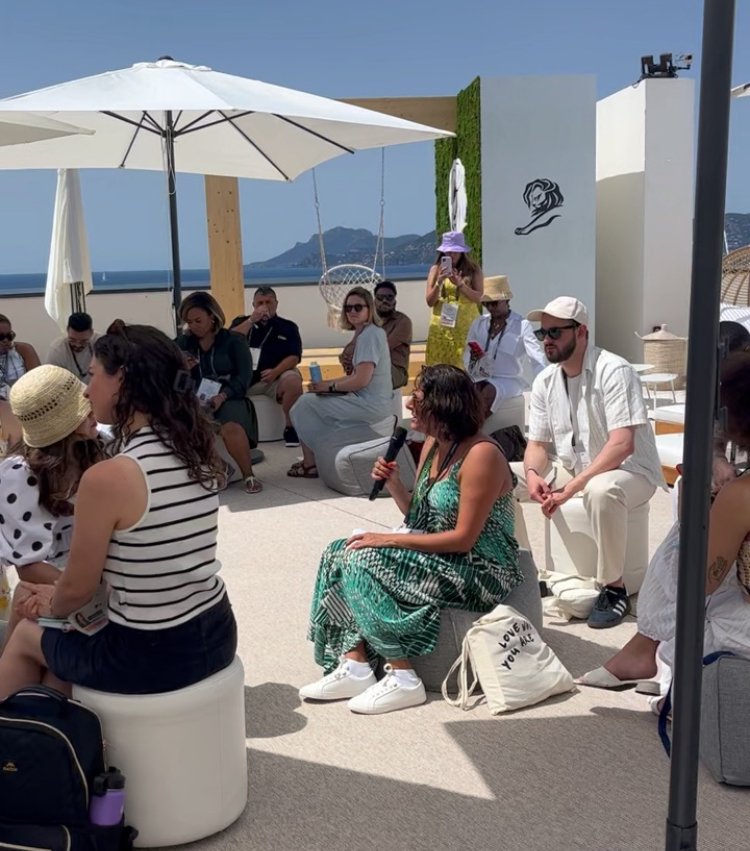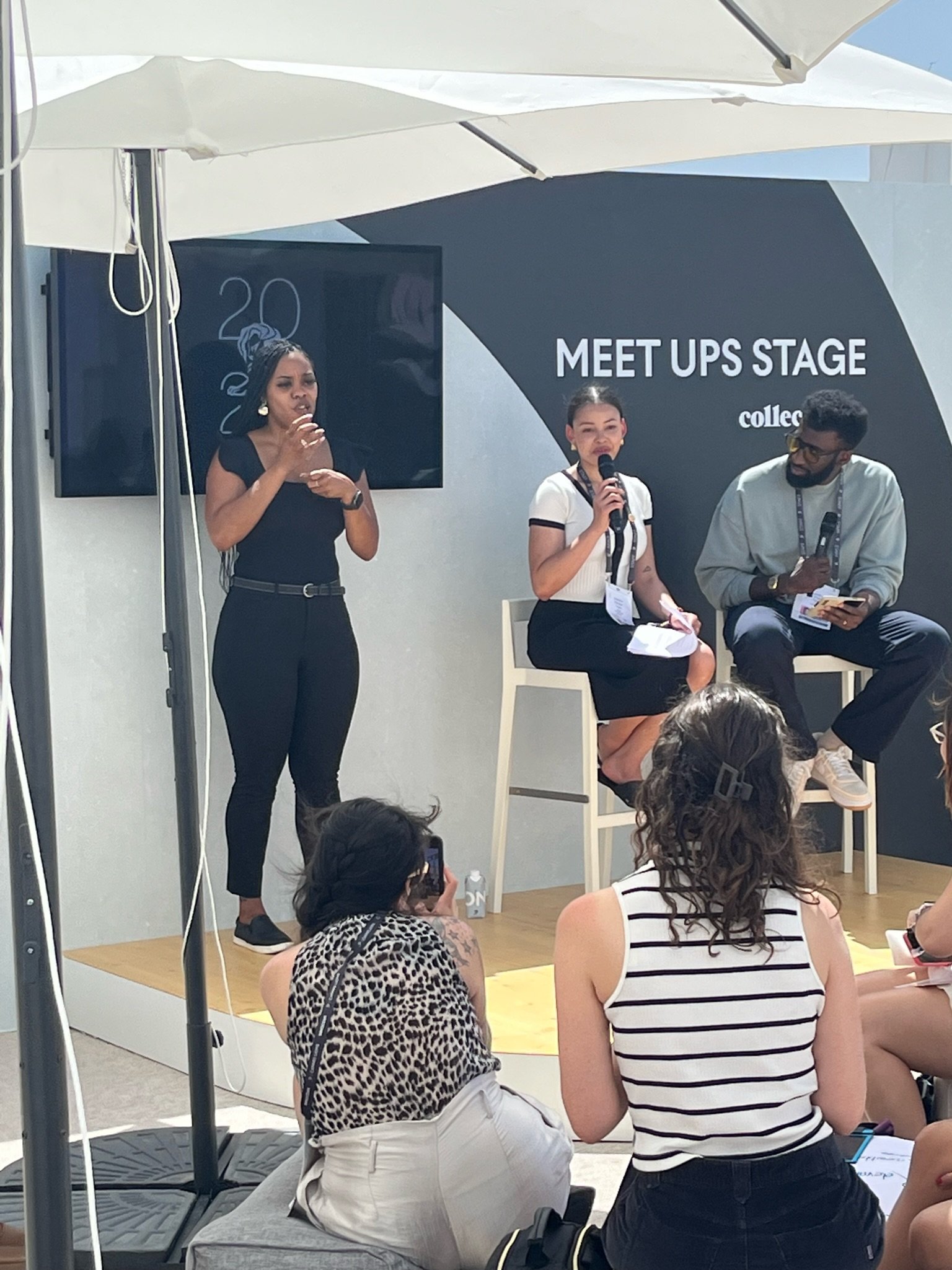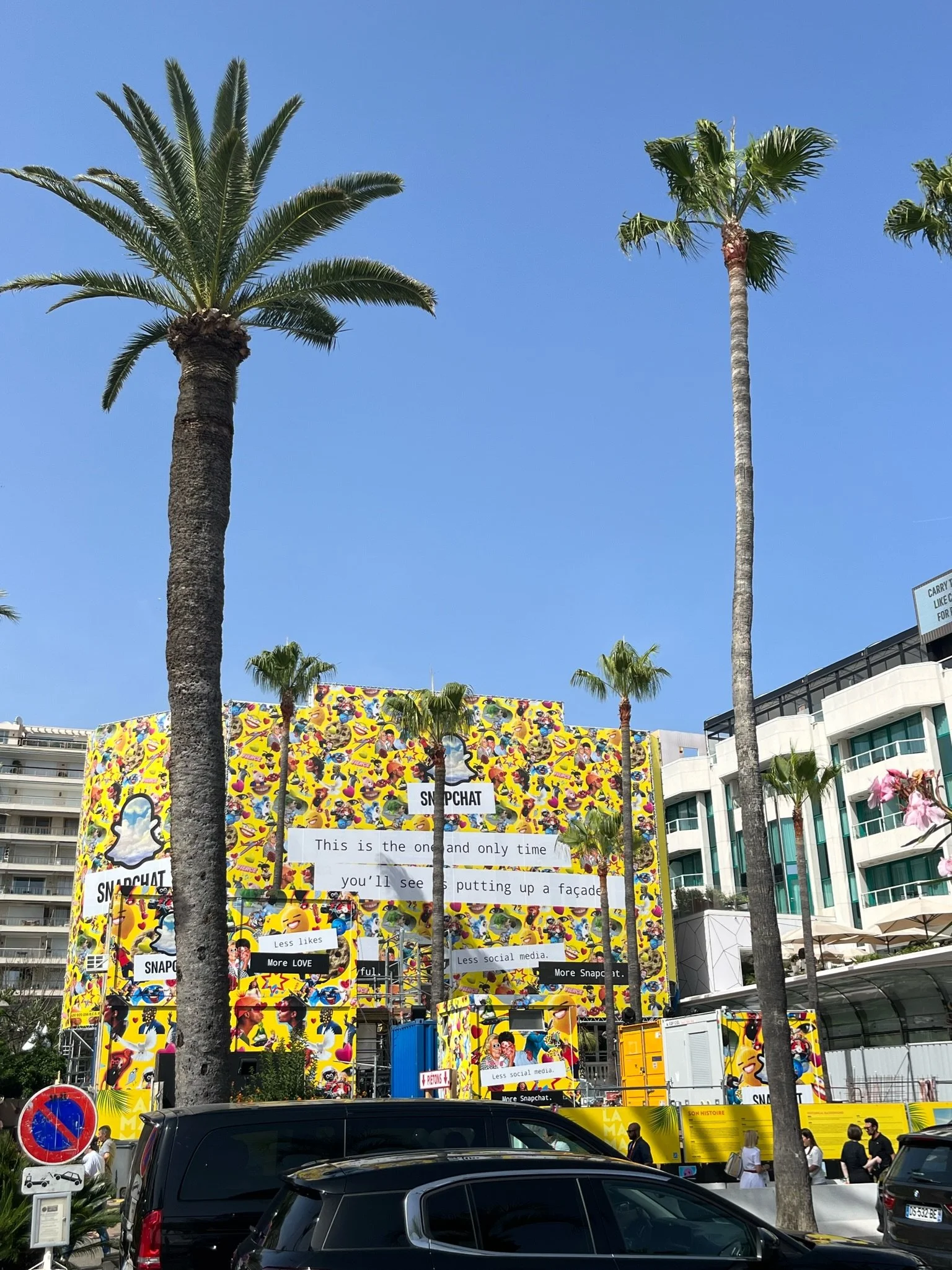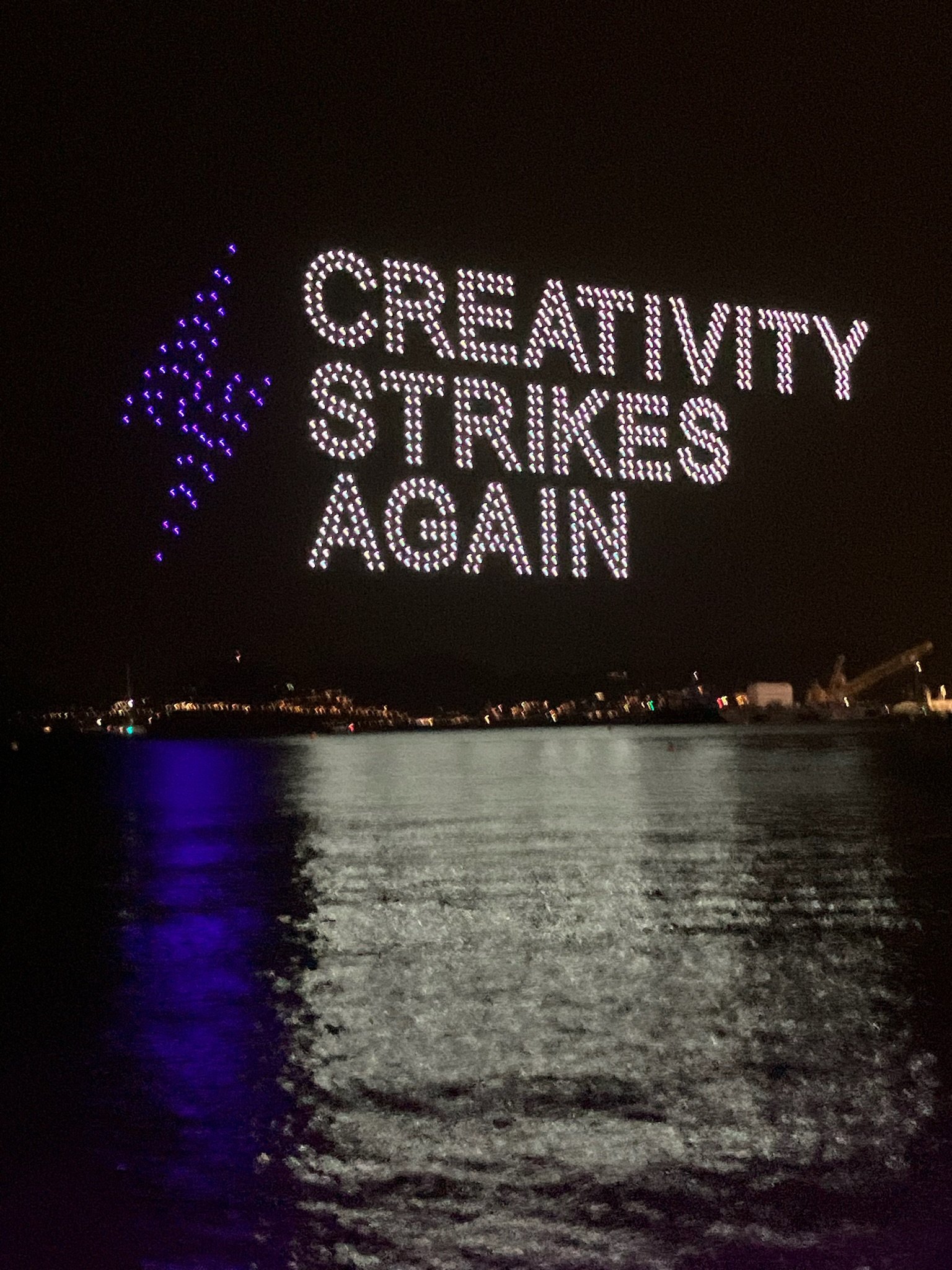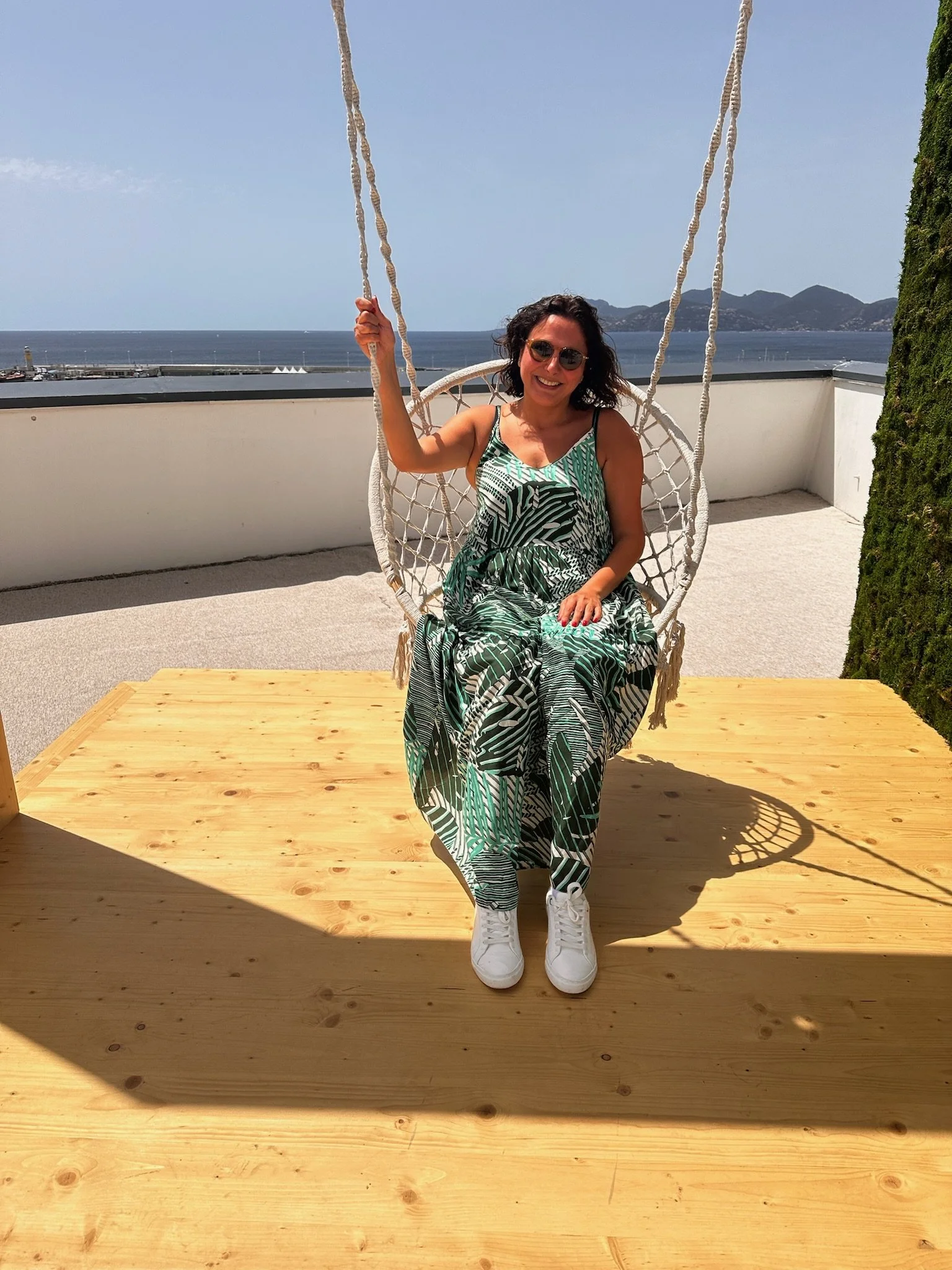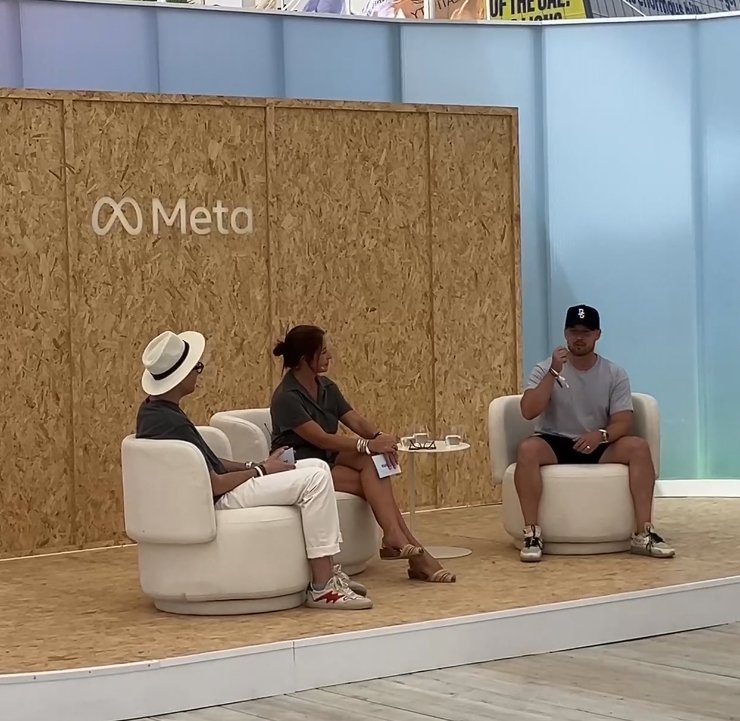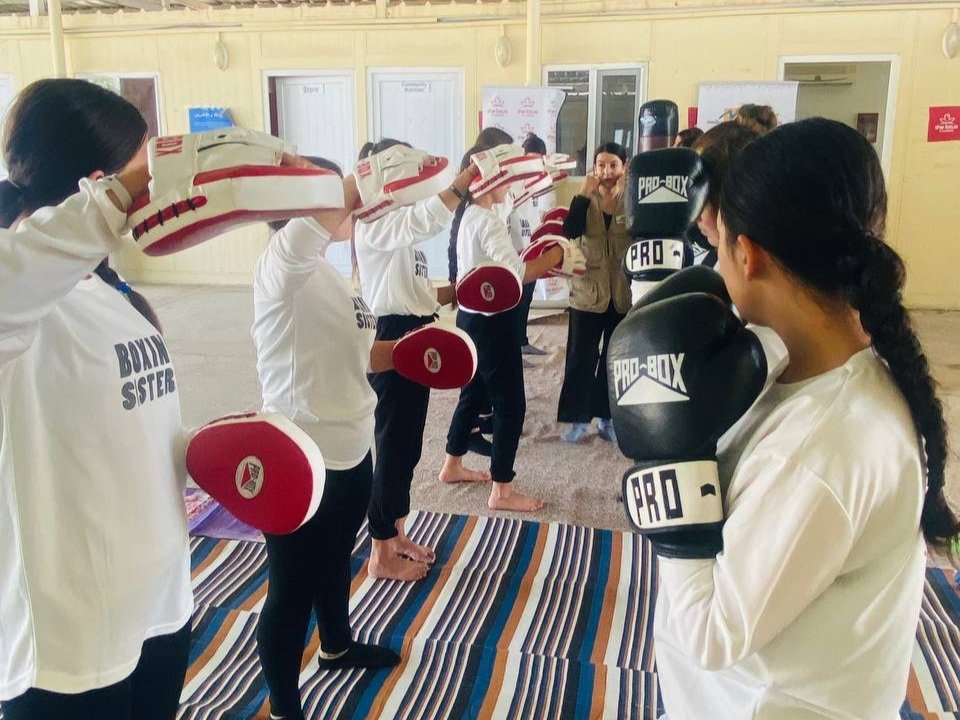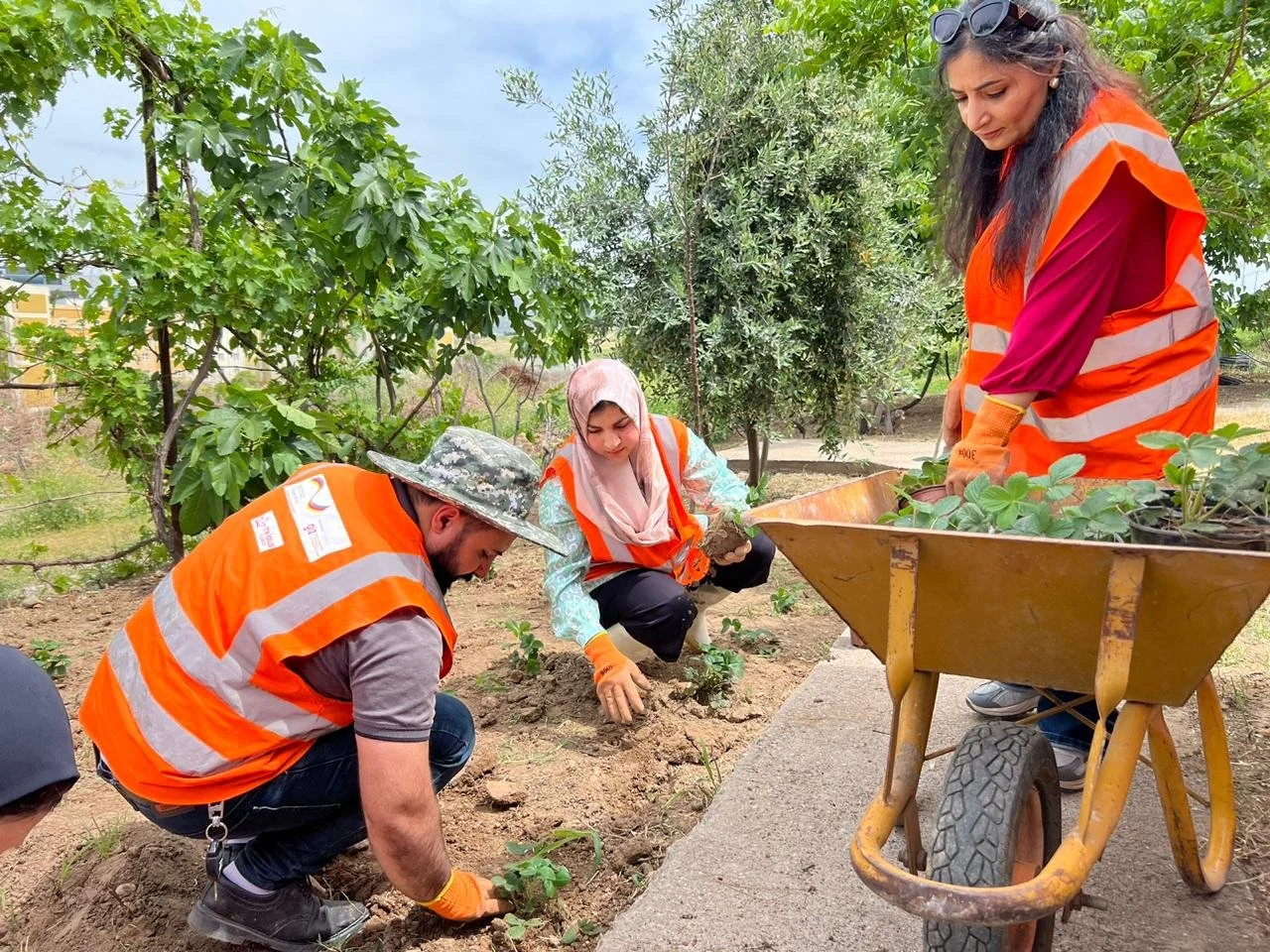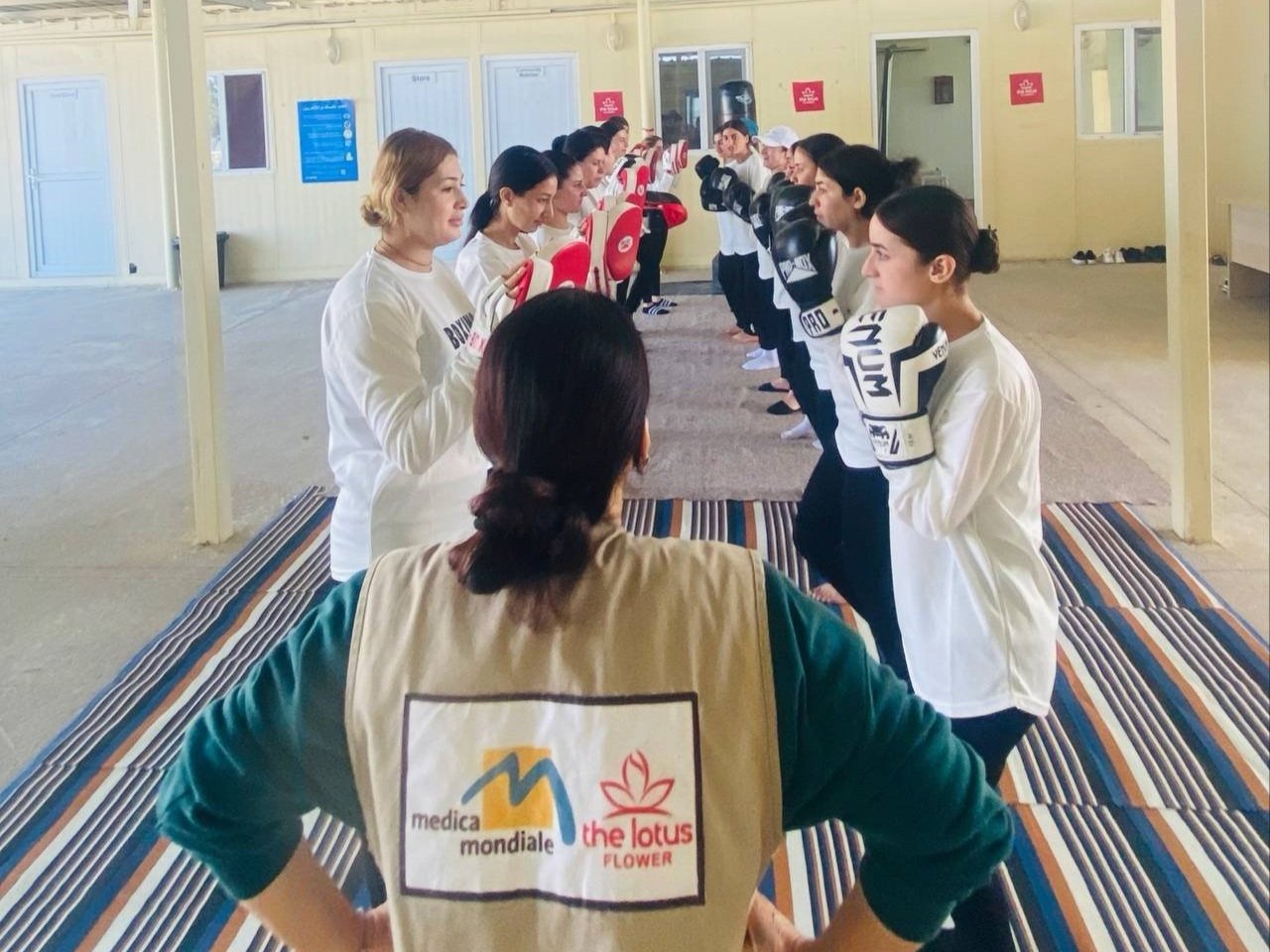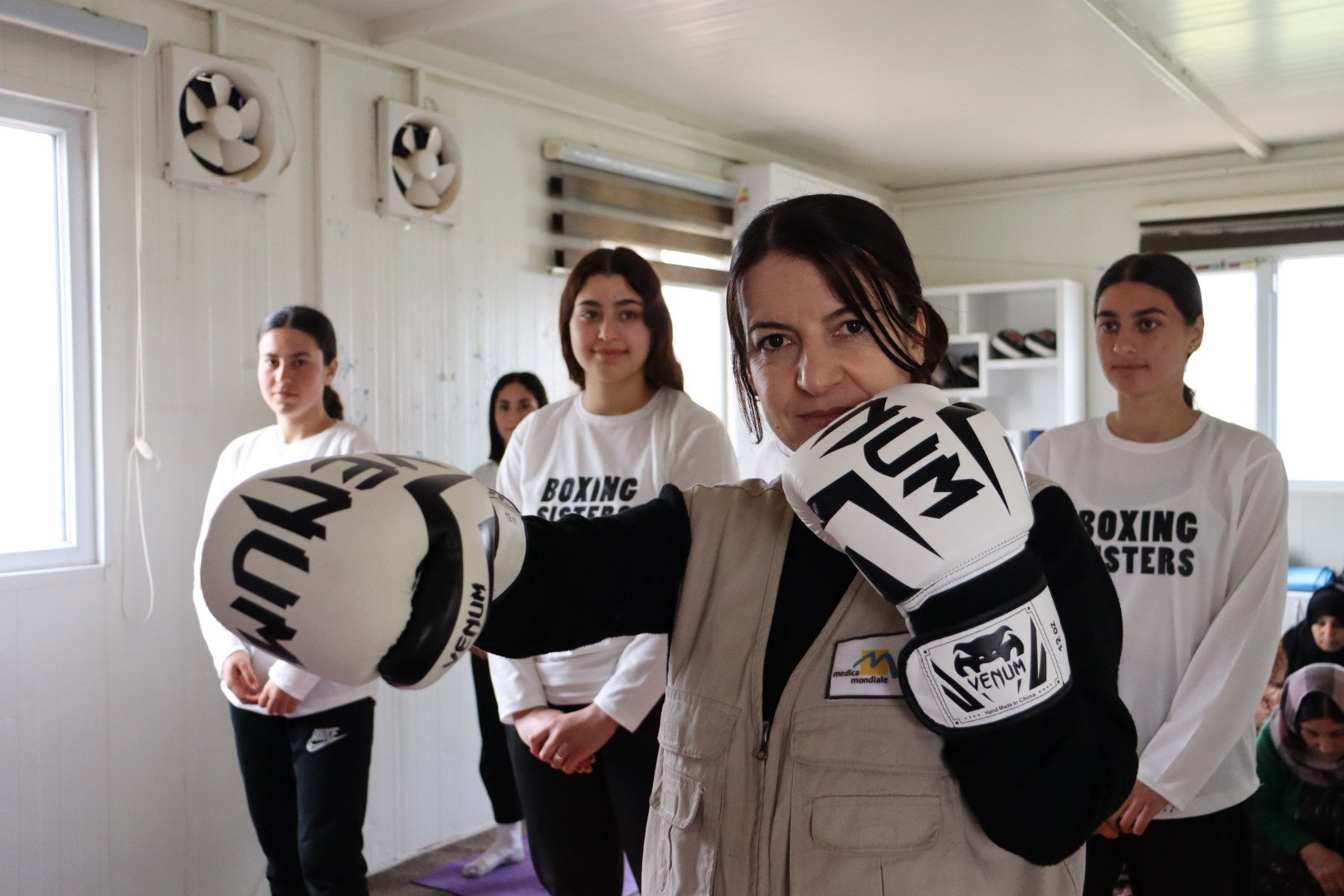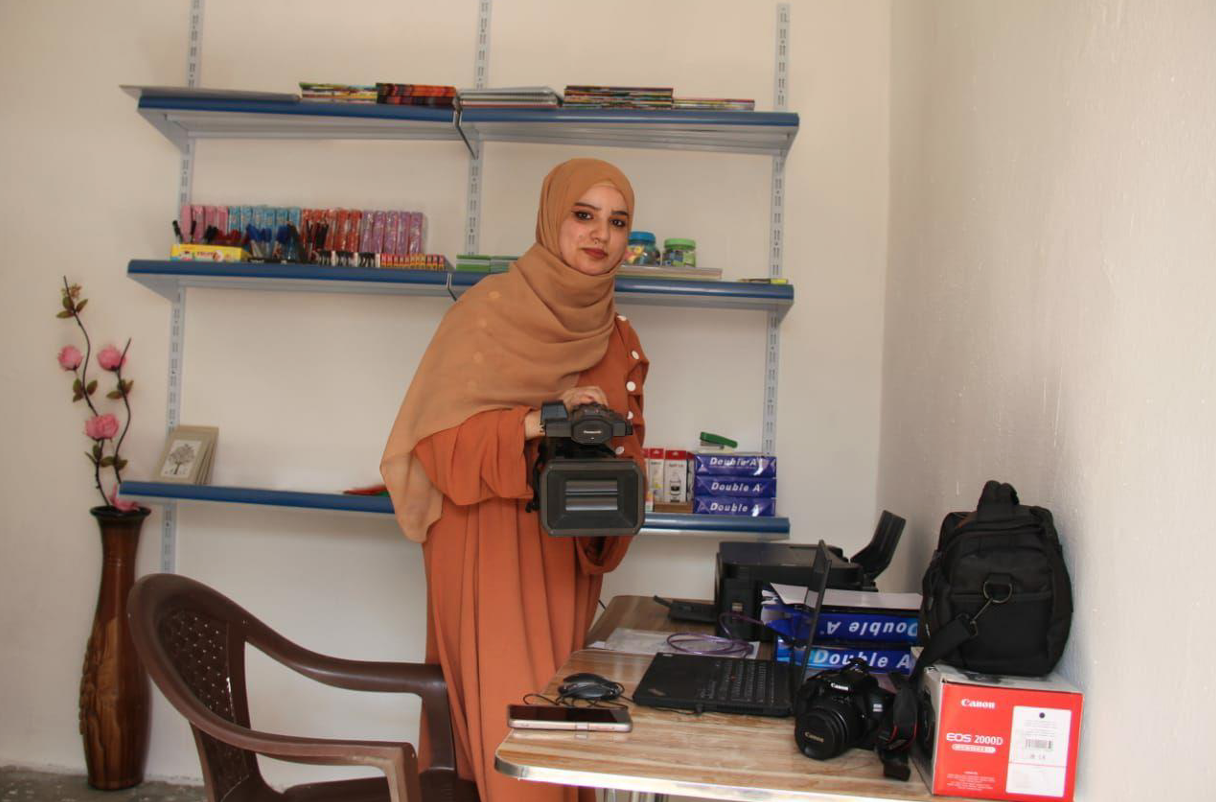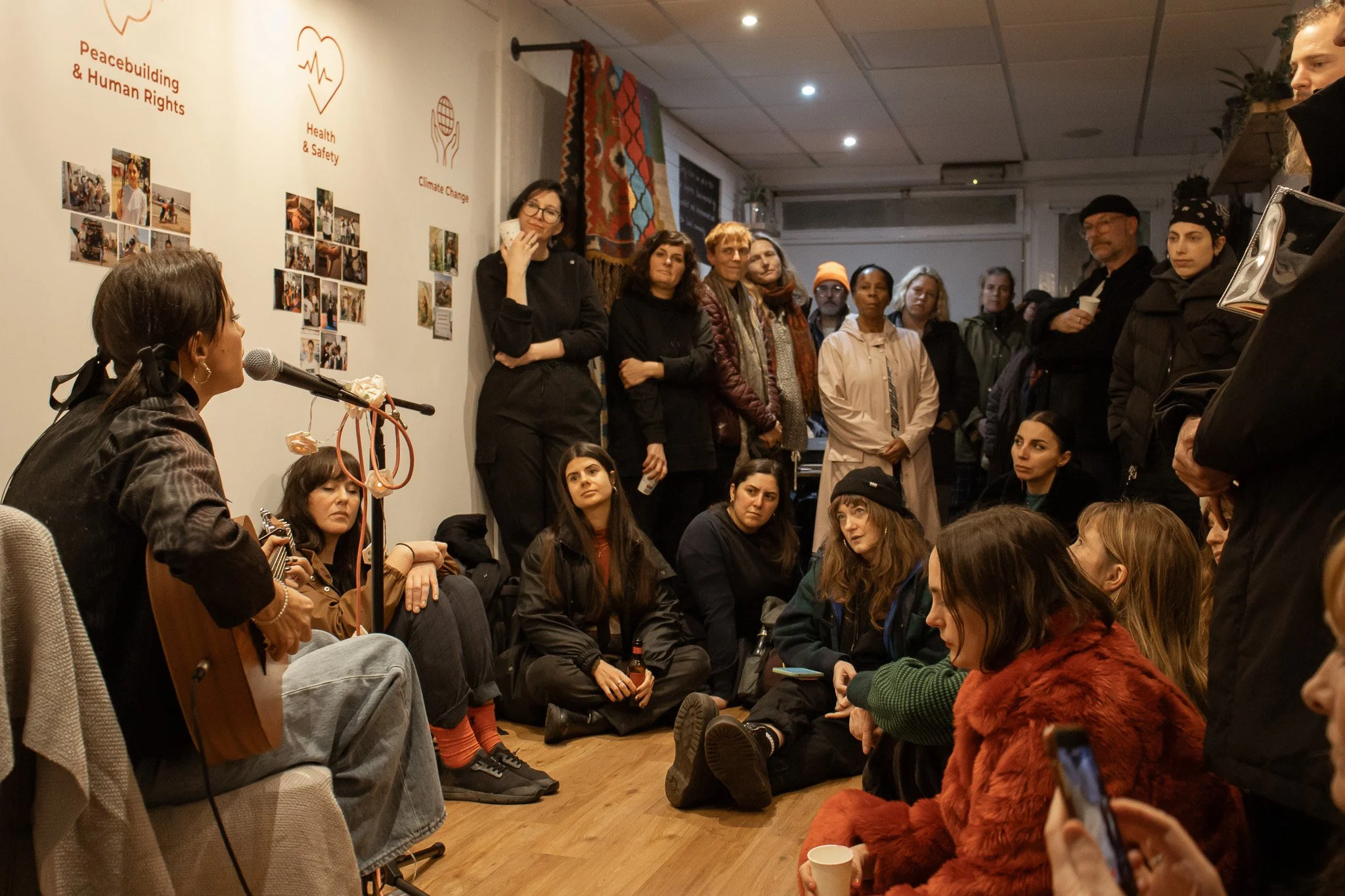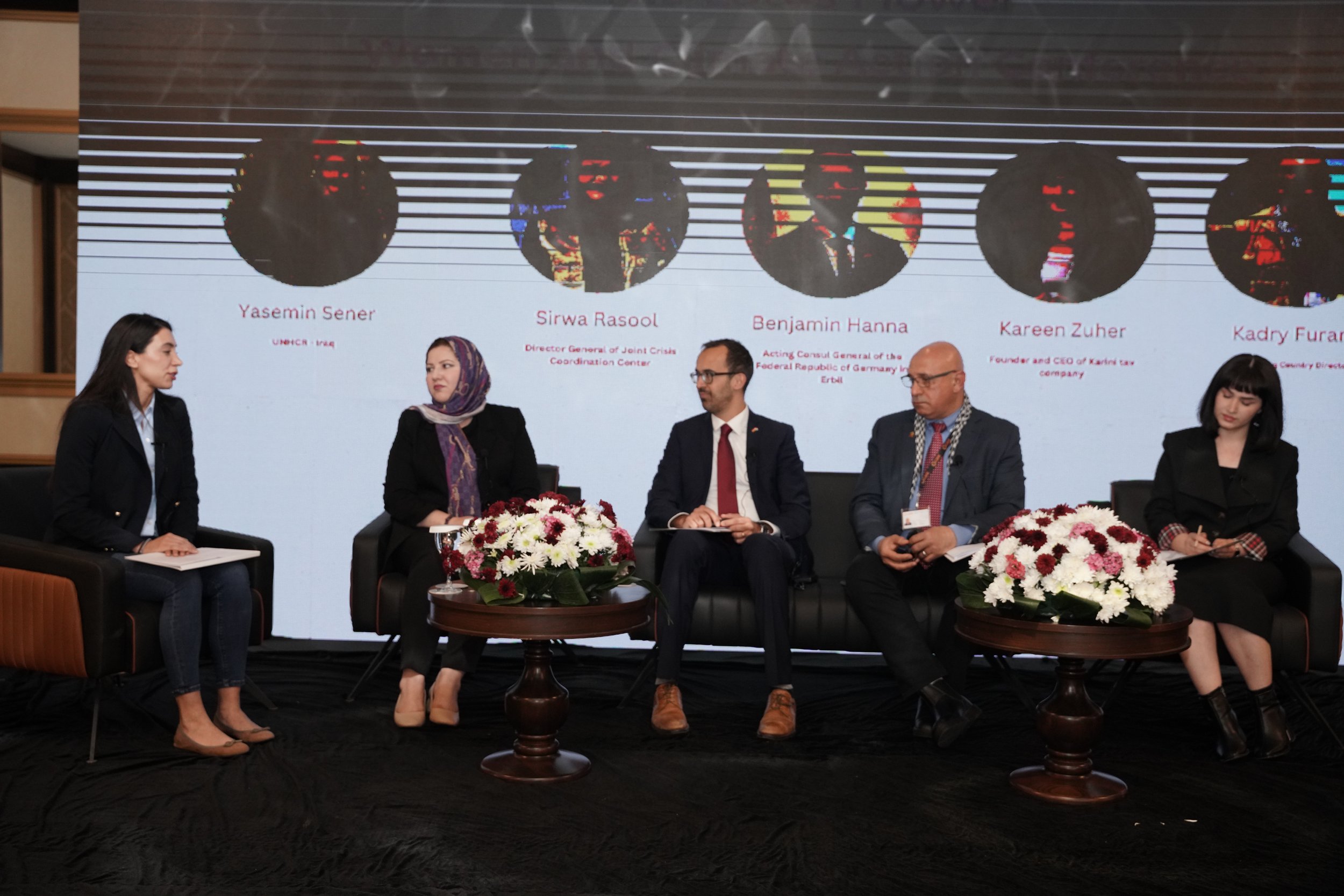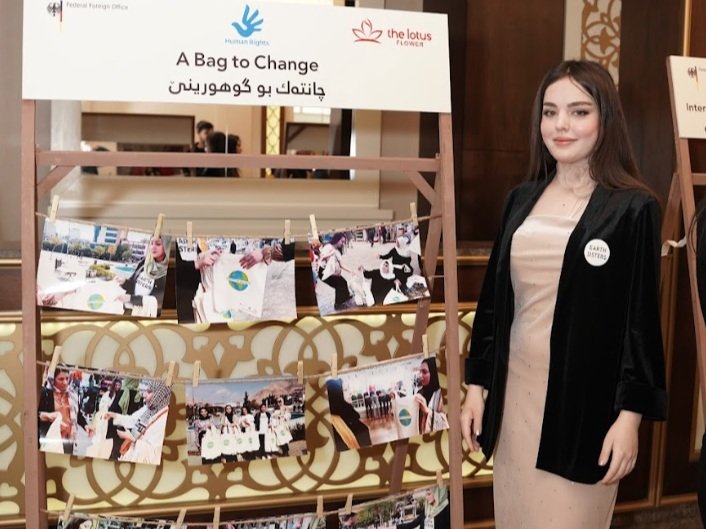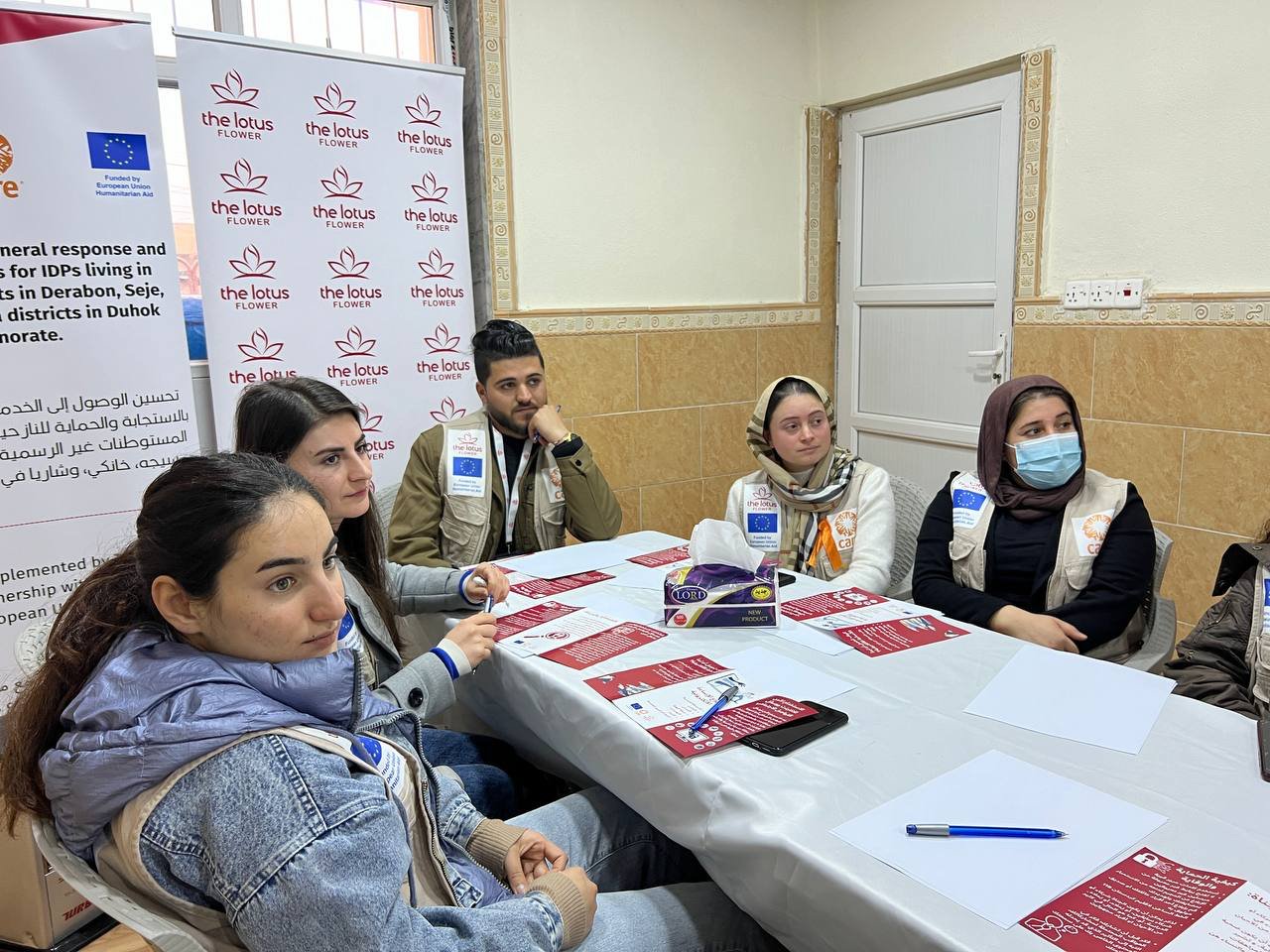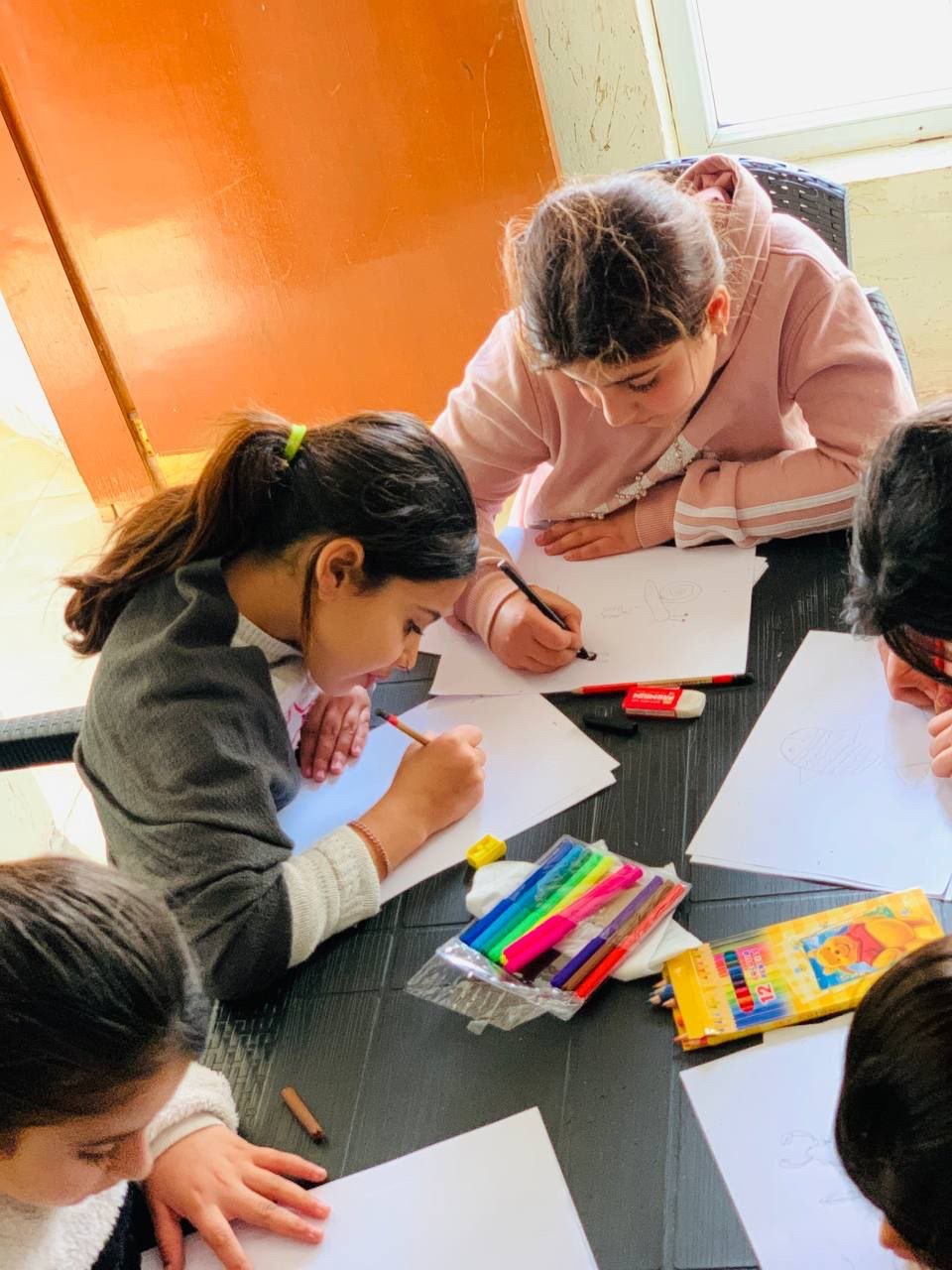Meet our Protection Monitor Zeravan
We spoke to Zeravan, the Protection Monitor in our General Protection project with CARE Iraq and European Civil Protection and Humanitarian Aid Operations, to find out more about his role and personal journey…
Hi Zeravan. Have you or your family been personally impacted by conflict?
“In 1988, my family fled to Iran fearing the Iraqi Ba’ath regime’s use of chemical weapons against civilians after committing genocide against the people of Halabja. My mother gave birth to me in displacement and I spent eight years of my childhood as a refugee in Iran. That caused me to drop out of the 1st and 2nd grade of primary school because I didn’t have the right ID as a refugee.”
How did you end up working at the Lotus Flower?
“I previously worked with another NGO, so after that came to an end, a friend suggested the Lotus Flower, which had multiple job opportunities at the time. One of these was for a Protection Monitor position so I applied, got shortlisted and after being interviewed, was offered the role. I was also familiar with the organisation through social media long before applying for the job.”
What’s your educational background?
“I graduated from Zakho University’s Faculty of Humanities in English Language and Literature. I then started my career in the humanitarian field after graduation.”
What does your job involve?
“The General Protection project covers four centres: Khanke, Shariya, Seje and Derabon. I go to all four locations and conduct protection monitoring activities at them. I observe protection concerns, and report and share them with the authorities and service providers, including at monthly meetings with the gender-based violence cluster of Duhok Governorate.”
What’s the best thing about your job?
“It’s that I get to make a significant impact by ensuring the safety and wellbeing of people who fled from conflict-stricken areas. For example, I encountered a young woman who had suffered significant trauma, and recognising her need for specialised support, referred her to our psychologist for counselling and emotional healing. Our aim was to assist her in rebuilding her life and restoring a sense of stability and hope. Then I learned that this intervention had a positive impact on her wellbeing.”
Tell us something people might not know about your role…
“People might not know that it’s not only handling protection concerns and risks, but also involves working to prevent conflict before it happens. This is done by analysing factors that increase GBV and taking actions to mitigate the risks, and also by providing awareness sessions.”
What else is good about working for the Lotus Flower?
“The collaborative environment and shared dedication to a common objective. Being a Protection Monitor has also personally benefitted me by enhancing my problem-solving abilities, increasing my situational awareness, and providing a sense of fulfilment from ensuring the safety of others.”
What do you hope to achieve through your work in future?
“I aim to ensure the safety and rights of vulnerable populations, collaborate effectively with stakeholders, improve humanitarian response efforts and empower communities to protect themselves.”
Our UN Trust Fund project supports Ghazal's bakery
Ghazal is a 42-year-old Yazidi woman originally from Sinjar who was displaced in 2014 due to the conflict impacting on her village.
She settled in Derabon camp, and for many years has been the only one working within her family. “I handle my whole family financially and take care of six kids,” she says.
During awareness outreach conducted door-to-door, our team met Ghazal and identified her as a possible candidate for business management training through our three-year project with The UN Trust Fund to End Violence against Women.
Ghazal was selected to participate in the four-day business management training course, as well as awareness sessions around gender-based violence.
“I decided to be a part of the business training in order to improve my baking skills, so that I can help my family and provide everything they need,” she adds.
Like so many victims of the conflict, Ghazal has suffered from psychological problems over the years, saying: “I wasn’t comfortable because my husband is unable to work, and that was the reason I was always sad.
“But after participating in the GBV awareness sessions I felt better because I was able to share my feelings and thoughts.”
Through the UNTF programme, we supported Ghazal’s venture by providing her with a dough mixer and an oven for her small bakery. She is already seeing improvements in her business, and says: “I hope I can make my shop larger in the future.”
The UN Trust Fund to End Violence against Women is the only global grant-making mechanism dedicated to addressing all forms of violence against women and girls at local and national levels. Our project has also seen us providing mental health support and case management services to survivors, as well as Positive Masculinity workshops which are designed to change traditional perceptions around women’s roles and end harmful behaviours against them.
We’re so pleased to see the new opportunity the project has brough Ghazal and many other women like her.
Inside the Lotus Flower’s week at Cannes Lions
As a sign of our recent growth, four members of the Lotus Flower’s UK team were thrilled to have the chance to attend the Cannes Lions Festival of Creativity recently.
We were able to take part through the Festival’s Equity, Representation and Accessibility programme (ERA), which opens doors for non-profits, disadvantaged individuals and charities like us in order to boost inclusion and diversity. It turned out to be an amazing week of creativity and networking, during which we were lucky enough to attend dozens of talks and events, and hear about key cultural shifts and movements, and the latest advances in the tech and creative industries.
Fron L-R: Jess, Sarah, Taban and Anna
Thanks to the ERA initiative, our Cannes collective included our CEO/ Founder Taban, our Development & Partnerships Manager Jess, our Community Manager Sarah and our Comms & Fundraising Manager Anna.
As always, the Festival drew the world’s biggest brands to the famous Croisette, which runs alongside the glorious Cannes seafront, and everyone from Amazon, Meta and Spotify to Google, TikTok and Pinterest had their own beautiful spaces to share ideas and practice and inspire conversation.
The Lotus Flower was primarily in Cannes to network and highlight some of the pressing issues around gender-based violence – especially with our findings from our successful GBV project with the UN Trust Fund. Insights from this project have shown us the role that tech can play in global solutions, and so Taban met with tech innovators to progress such discussions and explore possible innovations for the future. While at the Festival we also wanted to demonstrate how long term flexible funding from brands and companies can support small organisations like ours, and at the same time uncover ways of tackling global problems together.
The idea of brands working collaboratively with organisations like ours to make the world a better place was especially important as the Festival coincided with Refugee Week. To mark the occasion, Taban gave a talk at the WACL Empowerment Café, speaking to host Lisa Goodchild about her personal journey and explaining how brands can do more to give back. “We have the solutions,” Taban told Lisa. “It’s about creating discussions with us around how we can bring both sides together… Sometimes organisations and brands have a fear of doing it wrong, but I always say, ‘It’s OK, come forward and we can figure it out together. It’s a journey, we can figure out how we make impact.’”
With the Festival providing the ideal environment for such discussions to evolve, Taban continued: “There’s a massive space for brands to be included in this. How can they do it? The first thing I’d say is, think creatively. We’re in a creative space and creativity can really provide a lot of solutions.”
Speaking of her own motivations to bringing change in the world over the years, Taban stressed that any one of us can our channel difficult experiences to do the same thing. “I believe that every individual has the power to turn their trauma and their pain into purpose.”
In another informal session called ‘Building a manifesto for equitable access’ hosted by Frank Starling and Maxine Duggins from Cannes Lions DEI team, Taban spoke more about creative solutions. “Including people with lived experience in decision-making and leadership roles is really important,” she told the audience. “If there is a room where decisions are being made then there should be people with lived experience – whatever the subject or whatever the area being worked on – they should be in that room. For example, if you’re making a policy around gender-based violence, you can’t really do that if you don’t have a few people in the room with that experience.”
Other highlights from the week included talks by the likes of actress Gwyneth Paltrow and Twitter/ X CEO Elon Musk, while we threw ourselves into hearing from thought leaders and CEOs on topics ranging from AI to cutting-edge social and marketing trends, consumer engagement, the future of media – and so much more!
Check out our gallery of pictures from the week below…
Apply for our new livelihoods programme
The Lotus Flower is soon to begin a new livelihoods project with SEZ which will support women and girls through business training, plus financial grants to start new businesses and scale up existing enterprises.
We are looking to recruit 100 women and girls initially for the business management and development training. Of these, 24 women and girls will be selected to receive financial grants (12 for start up businesses and 12 for scaling up existing businesses). Scoring and selection will be conducted through a committee.
The target location is the Sinone sub-district and the surrounding area, and the preferred age for participants is from 18 to 35 years.
If you are interested in taking part, please apply as soon as possible here.
Live or work in Hastings? Have your say!
As you may know, we recently opened our first centre on the seafront in Hastings, and we're now really keen to find out what kind of community support and activities are most wanted and needed by those working and living locally.
We've created a short survey to help us explore ways of developing our services and activities, and if you’re local to the area we’d love it if you could complete it here.
As a thank you for taking part, if you enter your email address into the survey you'll be entered into a prize draw to win a beautiful rug which has been handmade by a woman in Kurdistan. This is optional and if you would like to remain anonymous you can skip this question.
We’re also looking to get the survey out to as many people as possible, so if you’re a local company or service provider in the area, it’d be amazing if you could help us with any outreach. We will be happy to share any data from our results with you, if you feel this would be helpful. There’s a flyer to download and print and social media asset here if you can help us!
Thank you for your support!
Watch our CEO Taban's second TEDX Talk
If you've seen our CEO & Founder’s first TEDx Talk from Paris, you can now also watch her second talk, which was recently recorded in Kurdistan.
This talk was for TEDx Nishtiman, and had the title Turning Pain Into Powerful Purpose.
Recorded in Erbil, it saw Taban discuss how her personal suffering has become a catalyst for making profound change over the years. Drawing on her harrowing experiences as a child genocide survivor and her battles with chronic illness, Taban illuminates how all of our adversities can be converted into powerful purpose.
She also challenges the audience to rethink their relationship with pain, offering insights into how embracing our struggles can empower us to achieve impact in our communities.
We’re sure you’ll be as inspired as ever by Taban’s incredibly moving and honest words…
Sisters' Stories: How Boxing helped Ghazalah get her life back on track
Trigger warning: contains suicide references
Ghazalah is one of the participants in our latest Boxing Sisters programme, kindly supported by Medica Mondiale.
Aged just 11 when ISIS attacked her region of Sinjar, she and her family were forced to flee their home, and they ended up at Rwanga displacement camp. Like so many victims of the conflict, Ghazalah experienced severe mental health challenges over the years, which in her case led her to question the point of life. Heartbreakingly, she says: “I once believed only suicide could offer relief from the terrifying obsessions I endured.”
But after struggling with recurring suicidal tendencies and overwhelming fear and uncertainty as a young woman, Ghazalah’s participation in our boxing course has resulted in huge improvements in her wellbeing.
The skills acquired during the training sessions have given her new inner strength and calm, while our trainer Nathifa has provided her with vital psychological support.
As the participants of Boxing Sisters usually find, the sessions also improve their fitness, confidence and self-belief, while enabling them to begin processing the complex emotions that are linked to past trauma.
Many of the girls have experienced unimaginable suffering while living through conflict and displacement, and being able to express their pent-up anger and grief in such a safe and supportive space is key to unlocking their recovery.
Ghazalah now feels much more optimistic about her future – and would like to become a boxing trainer herself in the future. Her story is just one of so many that show how this programme helps empower girls and bring them together for communal healing…
Watch our CEO Taban's TEDx Talk on the power of choice
We’re so proud and delighted to share this recording of our Founder and CEO’s first ever TEDx talk, which is now live on YouTube.
Taban’s TEDxMontmartre talk was recorded earlier this year in Paris, and saw her reflect on the big choices we have in life when we’re faced with crisis and adversity.
The 18-minute talk sees her recalling the trauma of her childhood, when she was taken prisoner with her family during Saddam Hussein’s regime in Iraq, and how a brave choice made by a group of Kurdish bus drivers saved them from an almost certain death.
Taban also talks about the biggest decisions she has gone on to make in her own life, including escaping an early marriage which turned out to be abusive, and her determination to launch the Lotus Flower in order to enable other women and girls to exercise their power of choice.
Check out the talk on the official TEDx YouTube page here, and please do like the video and post a comment on the page if you can, since all interaction and engagement will help spread the word about the Lotus Flower’s work.
We’re sure you’ll agree that Taban’s talk is incredibly powerful and inspiring…
Sisters’ Stories: “My life changed from useless routine to a more beneficial one”
Dereen is a 24-year-old from Duhok who has been taking part in our Cash for Work programme, in which she has been helping renovate historical sites to protect them for future generations.
Despite graduating from the department of Geology at the University of Duhok, Dereen remained stuck at home due to a chronic lack of job opportunities in the local area. But she always knew she wanted to work, in order to be able to be financially independent.
Prior to taking part in our project, which is supported by BMZ and implemented by GIZ and ourselves, she had little energy and felt depressed due to unsuccessfully applying for many jobs.
The project sees participants assisting the Directorate of Antiquity by restoring two historic castles, Kambalan and Dilbe. In doing so, they are preserving the sites for the enjoyment of others, and also safeguarding the city’s rich heritage and history.
Speaking of the project, Dereen says: “The Lotus Flower provided me with an opportunity to work in the restoration of historical places as a cash-worker. I met new people, achieved self-reliance, and enjoyed the experience, and my life changed from useless routine to a beneficial one.”
Initially, Dereen thought that the role would be too challenging. But, as she became involved, it became easier, and accordingly, her desire to keep working in historical locations has grown.
She believes that taking care of such monuments is important, since a nation’s identity is often defined by its history.
“I gained confidence, and in the future, I will be more prepared to work in a history-related role,” she adds.
Although the Cash-for-Work programme is temporary, Dereen now plans to begin searching for a permanent job in a similar field, and hopefully, the experience and practical knowledge she has gained along the way will stand her in good stead to achieve her goal…
Child Protection case worker Rezan on how our project has changed her
Based at Gawilan camp, Rezan is a case worker who is part of our Child Protection project with UNHCR.
In her role, she handles all kinds of situations involving vulnerable children and families on a range of issues relating to their psychological wellbeing, protection and safety.
Rezan is a former graduate of Business Administration from Bardarash Technical Institute, and has been with our team for almost a year.
Speaking of the most rewarding aspects of her job, she says: “It’s when I can make a change in a child’s life for the better, whether we serve them by ourselves or connect them to the required services.”
But Rezan and the whole Child Protection team inevitably face many tough scenarios in their work, and recalling one particular case, she adds: “I had one child marriage case, where the individual had many concerns – including serious mental health issues, problems with integration, legal documentation and lack of permanent shelter.”
Rezan worked with the relevant mental health services, camp management and UNHCR to provide the young girl with shelter, as well as arranging a lawyer who could help her with her legal needs. Additionally, she referred her to youth resilience and awareness sessions within our programme, and she was able to monitor her progress until she became mentally stable and happier.
Rezan believes she has grown personally through her work, adding: “Being a case worker has changed me a lot. I feel I have a stronger personality now. In the beginning it was difficult for me, but with time I improved my self-confidence, and learned new techniques like meditation, art, and eating more healthily.”
She also values the support of the Lotus team, saying: “Everyone is very cooperative, including senior management and my other colleagues. This is a very beautiful thing.”
As an NGO, we always strive to ensure our team can grow and progress through regular training and capacity-building, and Rezan says: "I gained a lot of experience here, which has helped my personal development. I worked with other NGOs before, and we would have only two or three training sessions in a period of two years, but with The Lotus Flower, the work environment is very different. Now I can depend more on myself.”
Now in its second year, our Child Protection project offers psychosocial support to at-risk children and their parents or caregivers, with activities including art therapy, music and sport, as well as stress and anxiety management, healing strategies and a focus on building positive relationships.
The case management element of the programme ensures at-risk children receive access to services such as emergency cash and medical treatment. In addition, the project includes capacity-building training on Child Protection measures for government staff and other community organisations and partners.
Our ‘Cash for Work’ team transform local sites
If you follow us on social media, you’ll probably have seen our ‘Cash for Work’ initiative in action – which is providing paid short-term employment for 200 young women and men locally.
The project, supported by BMZ and implemented by GIZ and ourselves, is addressing immediate economic needs, while also helping preserve and restore ancient sites and mitigating against climate change threats. It’s taking place In Duhok and Ninewa governorates, with 40 days of paid work for each of the 200 participants.
One of the activities is called ‘Art can change climate change,’ and has seen giant murals painted on public walls by creative participants in order to raise awareness about environmental risks.
Speaking of the Cash for Work programme, our Regional Director Vian says: “This project is important not only because it offers job opportunities, but because it allows young people to demonstrate their abilities and skills.”
In an effort to preserve local culture, another group is helping the Directorate of Antiquity in restoring two historic castles, Kambalan and Dilbe. By undertaking this work, they are not only preserving such monuments for the enjoyment of future generations, but also safeguarding the collective memory of the city’s rich heritage and history.
Another major project activity aims to help combat climate change and strengthen community resilience through an afforestation campaign across Duhok governorate and Ninewa plain. Thousands of fruit trees are being planted, expanding green zones and areas of shade, while also helping increase the absorption of carbon dioxide from the atmosphere.
The trees will additionally help boost food security, offering a promise of future harvest as well as a tangible symbol of resilience and sustainability for the community.
Meanwhile, another group of newly graduated women and youths are working in public nurseries, with thousands of seedlings planted to support the local environment, and create greener, more sustainable community spaces for the city. Through this work, the participants are also increasing their practical knowledge and hands-on agricultural skills, which in turn will prepare them for employment opportunities.
Complementing these activities, a big cleaning campaign is also underway, targeting public areas such as schools, markets and parks. The clean-up aims to increase awareness of the climate change challenges faced by Iraq and the need to better care for our planet. Participants are not only improving the visual look of their community, but their actions are showing others the importance of collectively taking care of our environment.
It’s great to see the positive impacts being made and the visible changes to these landmarks and natural environments…
Storytelling as activism: Interview with our CEO Taban
After our CEO Taban recently attended a Women, Peace and Security conference in the Hague with our partners Cordaid, the organisation has published a great article on the power of storytelling in activism.
In it, Taban refers to her own journey and her recognition that conveying uniquely personal stories was always going to be a major part of the Lotus Flower’s mission.
She says: “I knew that storytelling was going to be a big foundation of how to move it forward and I utilised my own personal lived experience to really help us push that narrative through.”
Photo by Mickael Franci
The conference was part of Cordaid’s Women Voices First programme, which has established partnerships with more than 30 Iraqi civil society organizations (CSOs) and women’s rights organizations (WROs) to advance the WPS agenda, with a strong emphasis on localised support.
You can read the full piece with Taban here.
Meet our Boxing Sisters trainer Nathifa
As an integral part of the Lotus Flower team, we’re so pleased for you to know more about Nathifa, our Boxing Sisters trainer.
She has been displaced for a decade, and was forced to flee her hometown of Khanasor during the ISIS conflict. “We left everything behind and came here without having anything to eat,” she says.
After finding herself at Rwanga displacement camp, Nathifa began volunteering with the Lotus Flower in 2016, which she did for more than a year. She then began providing yoga and boxing sessions for other women and girls in the camp.
As a certified boxing trainer, she now runs our hugely popular Boxing Sisters programme at Rwanga, which is currently being supported by Medica Mondiale.
Speaking of her role in teaching participants boxing, Nathifa says: “Self-defence skills are essential in our daily lives, and I enjoy knowing that my coaching and training builds positive thinking and shows girls how to manage daily stress and gain muscle.
“I have a close relationship with all the girls inside the camp and try to help them when they’re having a tough time.”
Nathifa recalls another incident where she has personally made a real difference to a woman’s life, saying: “One survivor refused to leave her house. She had two children, and one day in my lunch break I visited her, but she still refused to leave. I kept visiting her until I convinced her to attend our literacy and sport classes.
“She was living in very poor conditions, and only had one blanket to cover herself and her kids. I tried to help her through donations here from the camp management, and asked other humanitarian NGOs to help. She now lives in an apartment provided for her, and keeps thanking me for what I did.”
Nathifa says having such a positive impact on other survivors brings her real benefits, too. “My work with the Lotus Flower enhances my own mental health, because my skills make a change in other people’s lives.”
in her day-to-day role, Nathifa values being part of the Lotus Flower family, adding: “All of my colleagues are very cooperative, and the management team are just like friends. We don’t hesitate to ask for help, because everyone is so supportive.”
In future, she hopes to get her international boxing qualification, as well as more advanced kit and equipment to benefit those she teaches. We’ll certainly do everything we can to make sure that happens!
Watch this Instagram video about our Boxing Sisters…
We attend Women, Peace & Security conference in the Hague with Cordaid
Our CEO Taban and Regional Director Vian were delighted to join a delegation of women human rights activists for a conference on Women, Peace & Security (WPS) in The Hague recently.
They were part of an advocacy group led by our long-term partners Cordaid through its ‘Women Voices First’ programme.
During the week-long event, Taban and Vian contributed to some useful sessions with other women and youth delegates from civil society, women-led organisations and NGOs, Dutch parliamentarians and policy decision-maker, all committed to advancing the WPS agenda.
Talking points included the intersections between poverty, women’s socio-economic empowerment, post-conflict recovery and peacebuilding efforts in fragile countries, and we were able to provide our unique on-the-ground perspectives and emphasise the importance of partnerships for locally-led development.
With political and regional conflicts continuing in Iraq, civil society and women rights organisations like ours face considerable challenges in advancing peace and security efforts and human rights work.
The aim of the conference was for key stakeholders to be able to discuss current geopolitical and security matters, while exploring the implications on civic participation.
Women Voices First is funded under the British National Action Plan 1325 and the Conflict Stability and Security Fund (CSSF), and is implemented by Cordaid, in collaboration with organisations such as the Lotus Flower. Its primary objective is to enhance the representation of women in peacebuilding and governance processes across Iraq and Kurdistan, with an emphasis on localised support.
We’re so pleased to be at the forefront of these crucial discussions…
Sisters' Stories: "Women and girls are strong enough to make radical changes in their community"
Fatima is an incredibly courageous young woman who we’ve been able to support through one of our livelihoods projects with SEZ.
Originally from a village in the district of Bashiqa, she is a survivor of physical and psychological violence, and was forced to quit her studies at university by an abusive husband.
Fatima eventually got divorced, but then suffered more misfortune when she fell ill with a tumour. She managed to keep studying despite a gruelling hospital treatment programme, and thankfully, she eventually recovered and was able to graduate.
A year later Fatima remarried, and after her father bought a house for her and her new husband, she decided to seek employment to help stave off depression she was experiencing.
It was then that she applied for our livelihoods opportunity in Bashiqa, which saw her participate in business management training. She was then able to embark on a career in photography, and soon afterwards opened her own ‘Sama Studio’ in her village. As well as offering photography, printing and framing services to clients, she sells stationery items to students, and now earns a modest income to support herself and her husband.
Having made a success of her business, Fatima says: “This was the first chance I had to use my skills practically. I am convinced that women and girls are strong enough to make radical changes in their community, and now most people accept the idea that they can run a business successfully.”
Fatima is pleased to have become something of a role model for other women and girls in her area, and she has also written essays and articles about social and domestic issues for Iraqi and Kuwaiti newspapers.
SEZ, also known as the Baden-Württemberg Development Cooperation Foundation, has been one of our key partners since 2020. Together, we have delivered multiple several successful projects, including awareness-raising around the Prevention of Sexual Exploitation and Abuse. And as a huge supporter of our Women’s Business Incubator programme, SEZ has helped us change the lives of many other women like Fatima.
We hope to keep creating such opportunities for a long time to come!
All the news and photos from our big UK launch night
We’re so happy to share the news about the official launch of The Lotus Flower UK, which took place in Hastings in Sussex recently.
Our small UK team was delighted to be joined by a roomful of friends and volunteers as we opened the doors to our little event space and shop on the seafront.
During the evening there was lots of inspiring conversation, food and drink, and we enjoyed two beautiful sets from musician tygermylk, who transfixed everyone with her heartfelt songs.
The evening included a raffle too – and we’re so grateful to all those who donated prizes locally. We also began selling creative items made by women from all over the world, including colourful rugs and bags from Kurdistan.
Meanwhile, our Founder Taban gave a speech in which she thanked everyone who has helped us finally kickstart our work in the UK, and our Community Manager Sarah pointed out all the different features of the shop, including a co-working area which is now available for freelancers to use. As a donations-based space, you can work amongst likeminded people, share creative ideas and meet new people, all while giving back for good. If you’re interested in registering for co-working, please email Sarah on sarah@thelotusflower.org.
Hot on the heels of the launch, we also held our first workshop with Healing Souls, in which wellbeing coach Lauren explored the concept of the inner child. We’ll be holding lots more events over the coming months, and if you’d be keen to run your own creative or holistic workshop for the community, either as a series or a one-off, please do fill in this form and let us know.
We’re also looking for volunteers to help us keep the space open day-to-day, and if that’s something you could help with occasionally, you can complete the form here.
In the gallery below, you can see many more photos from the launch event – and a massive thanks goes out to JJOY Freelance for so many lovely images of such a memorable night…
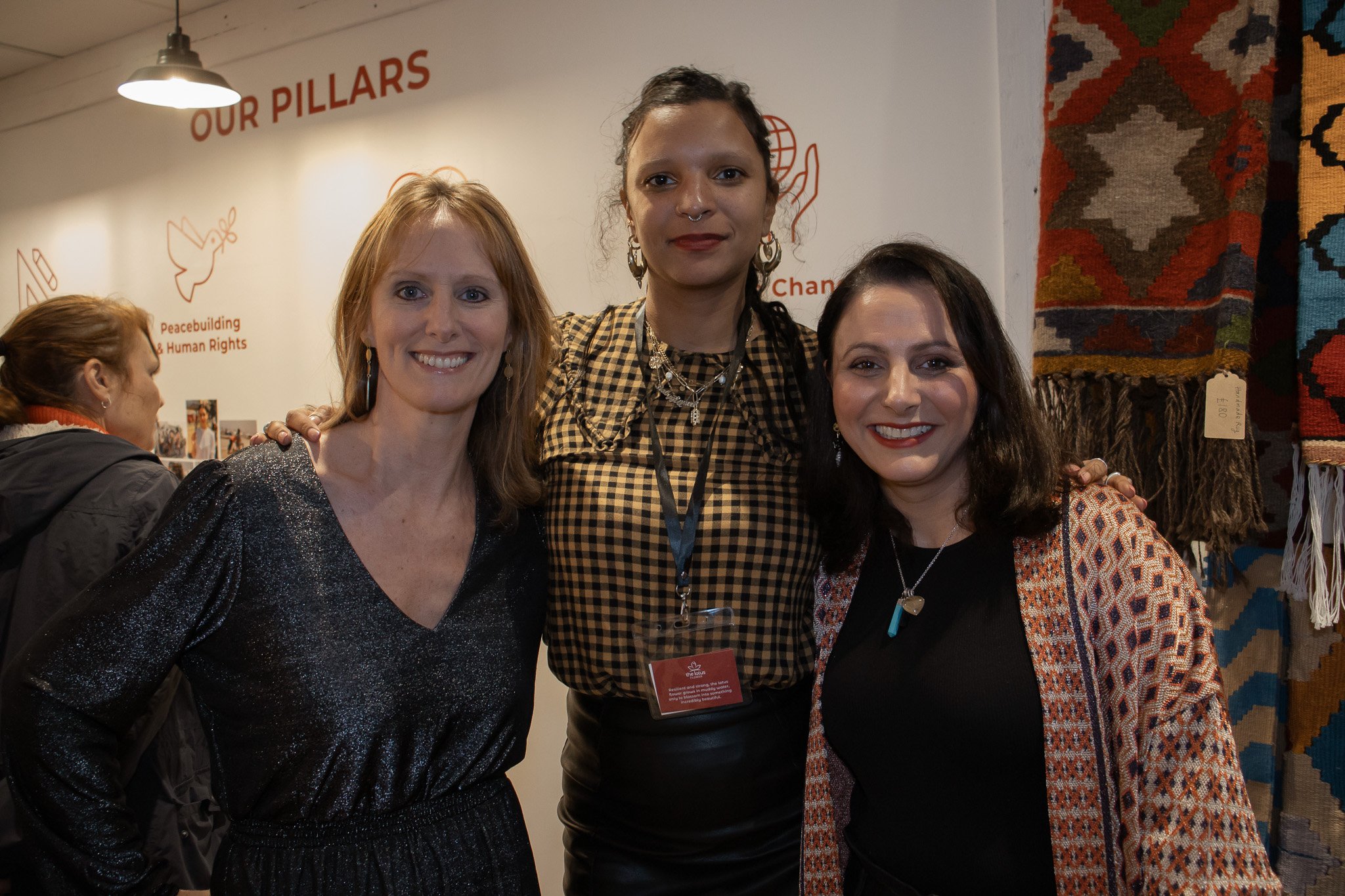
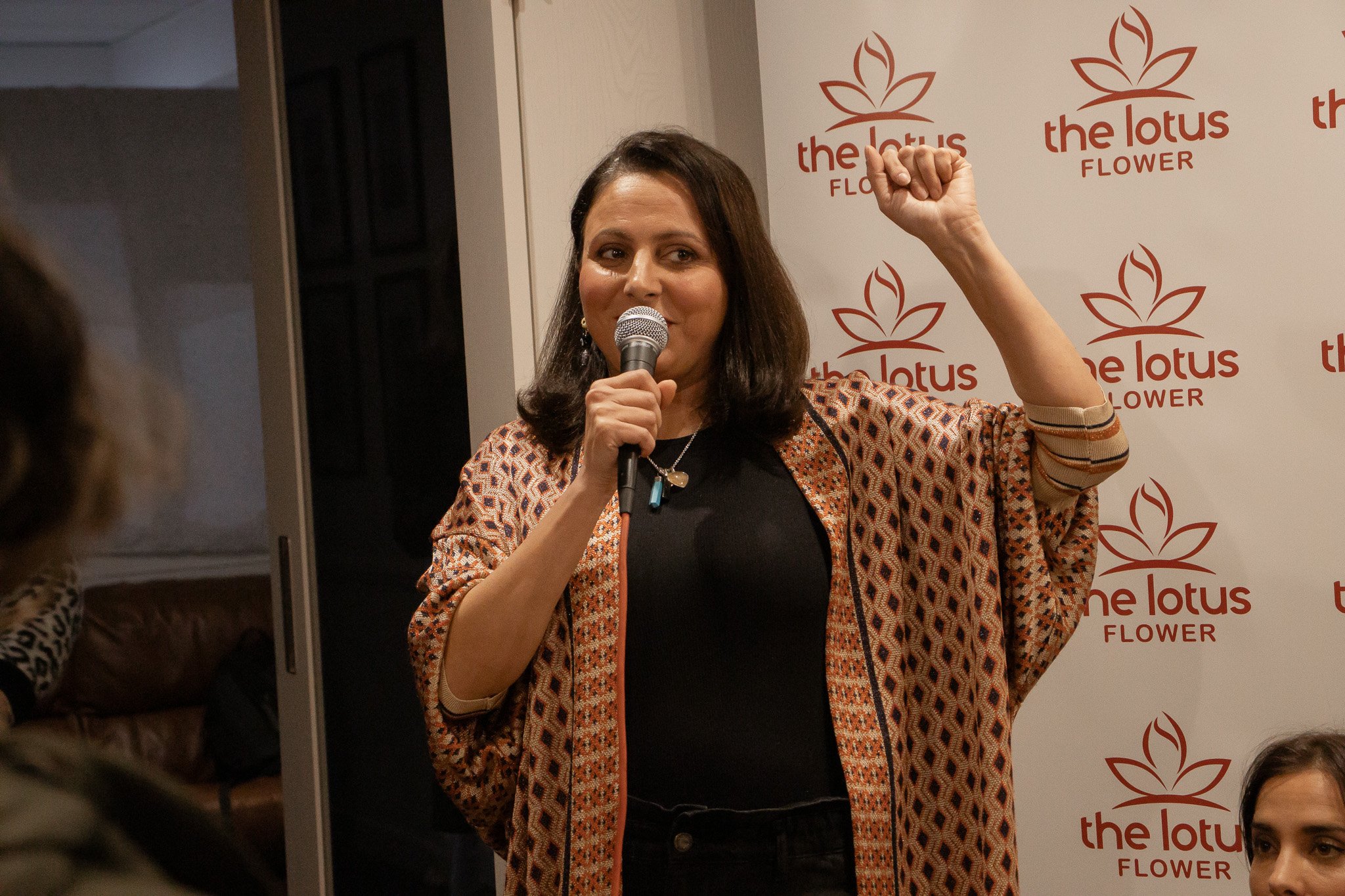
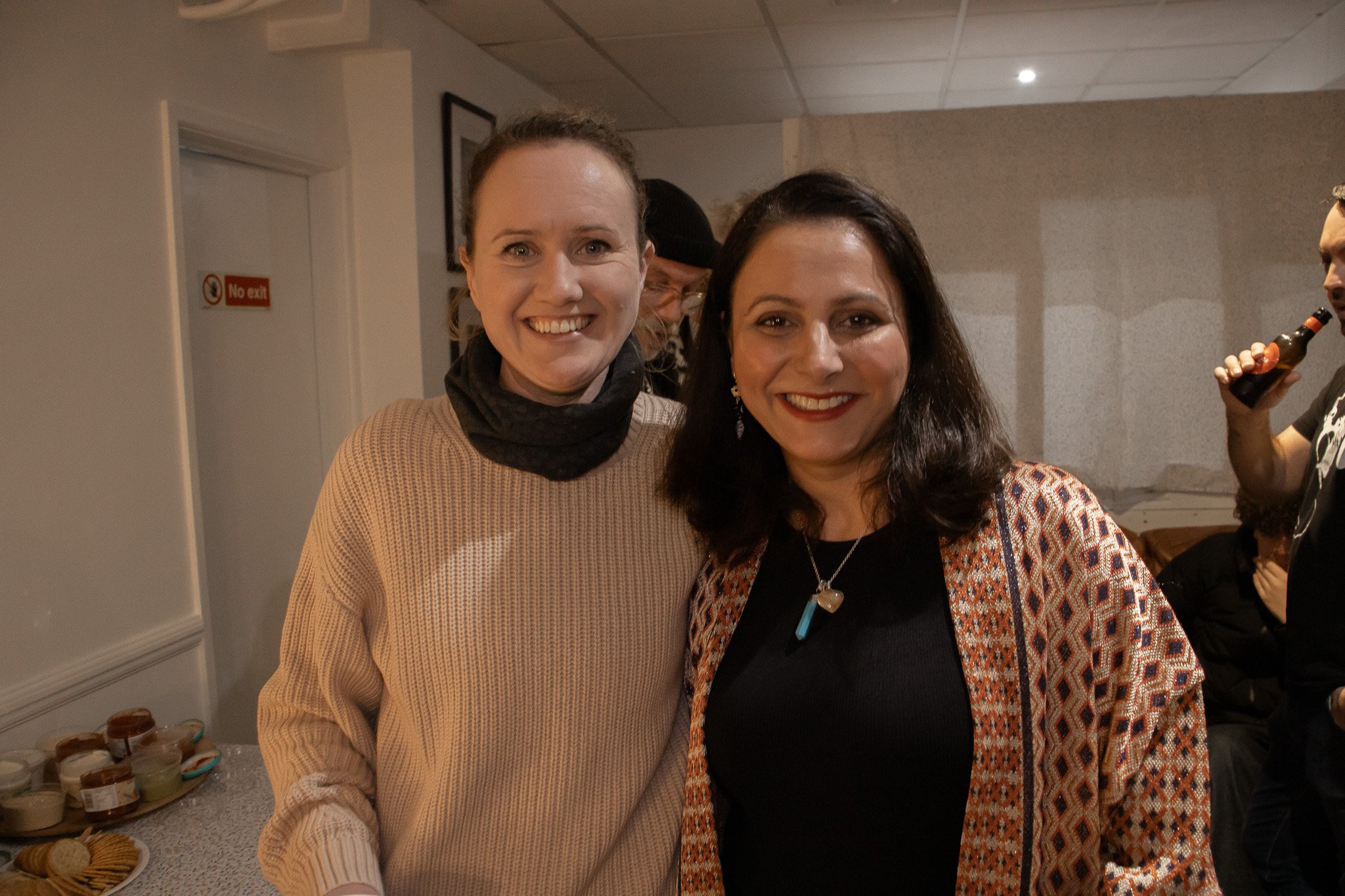
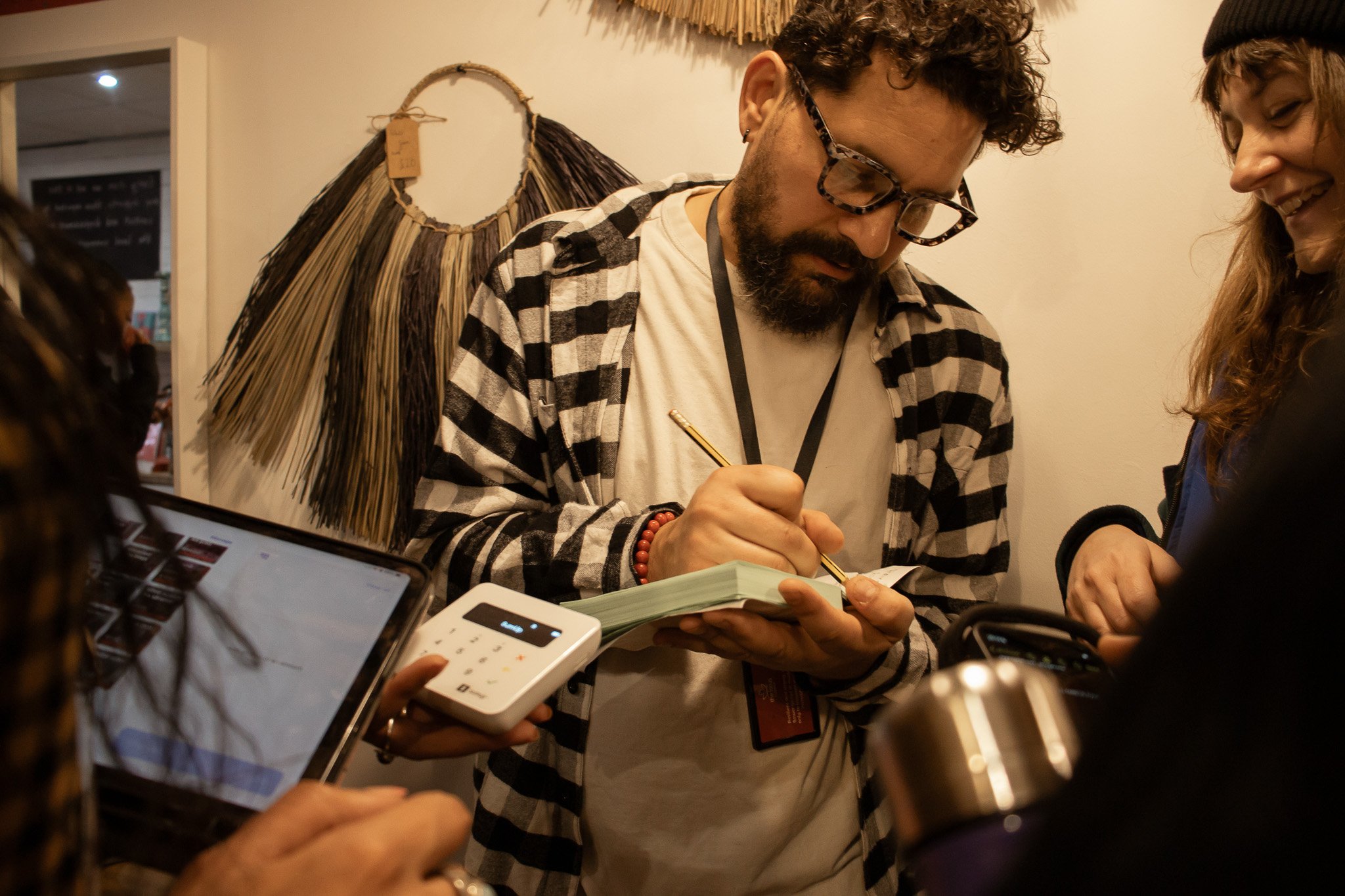
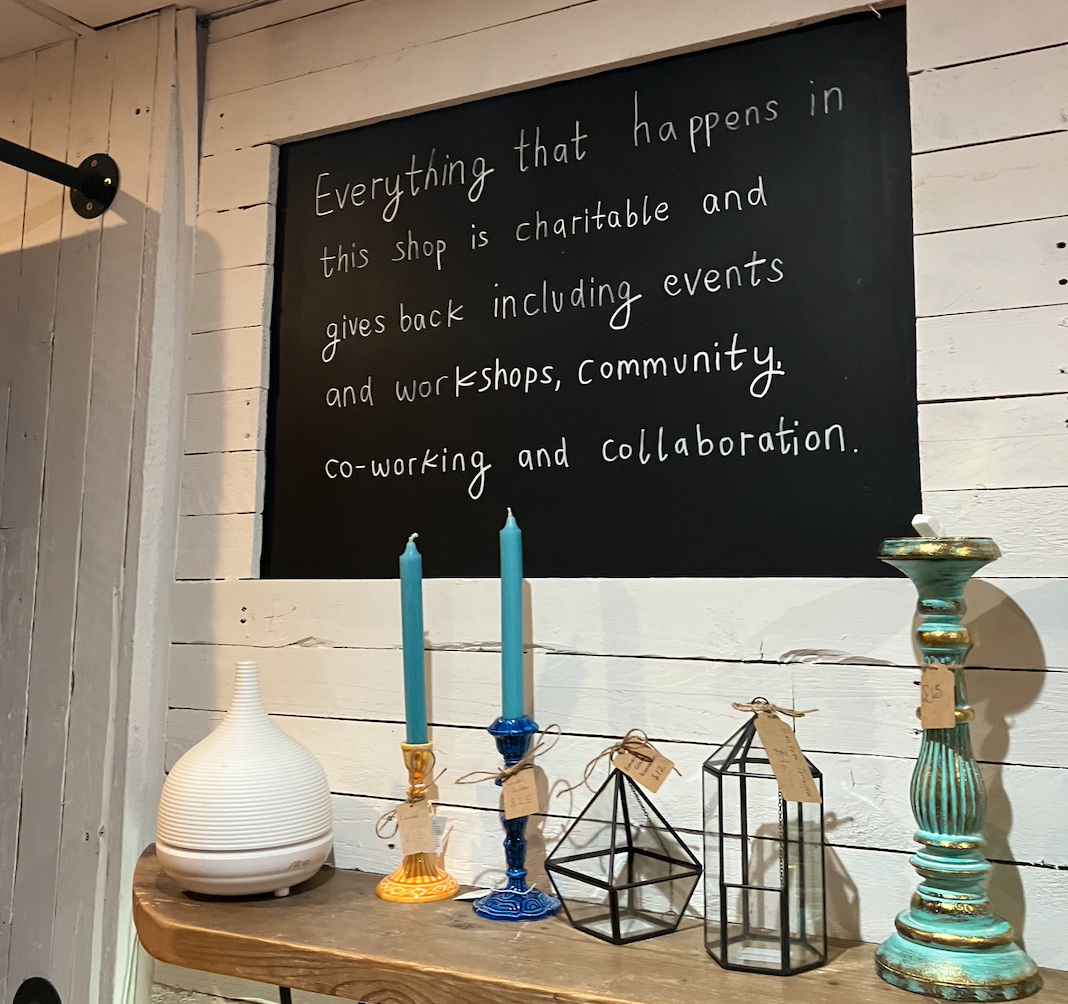

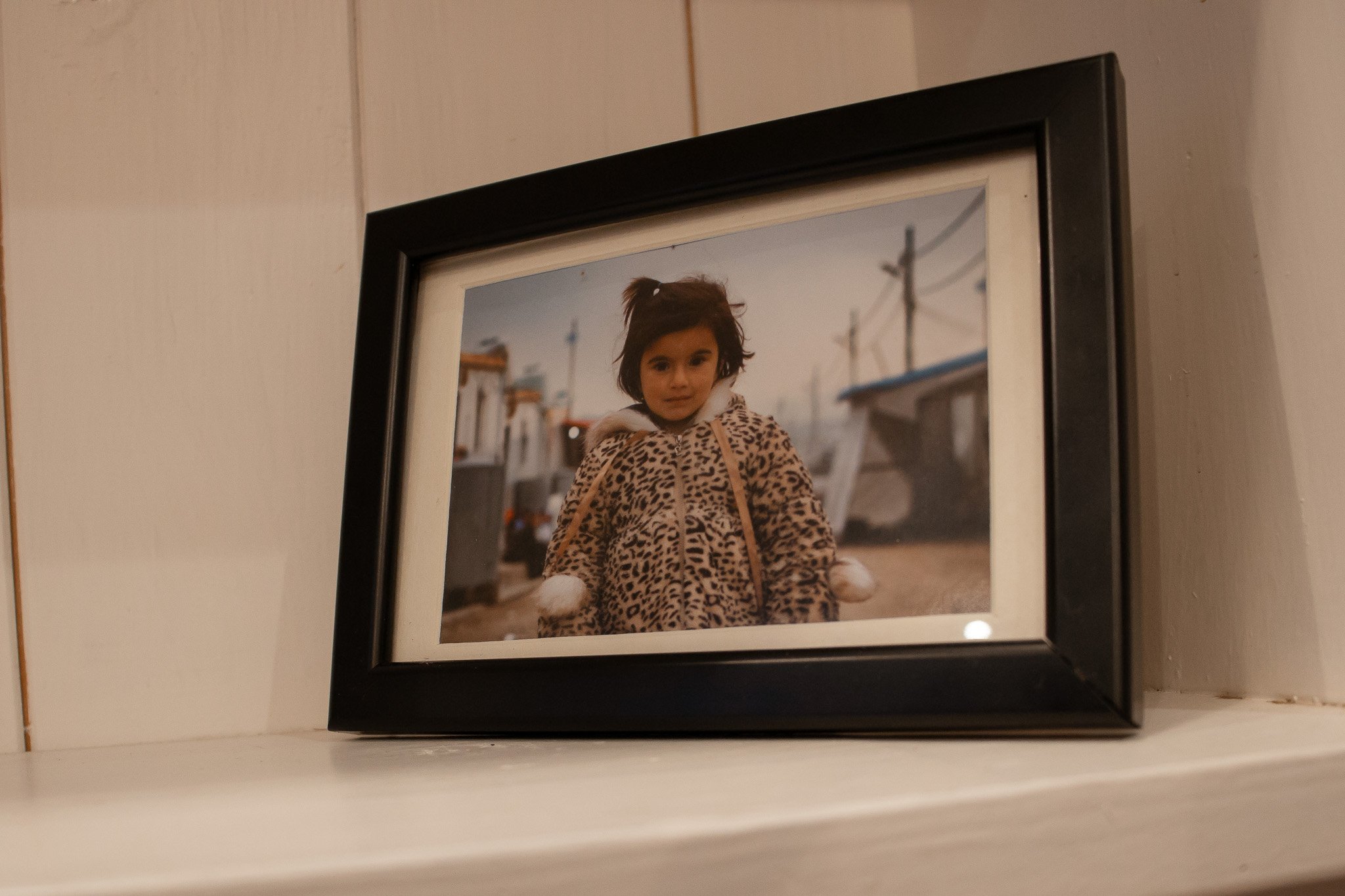
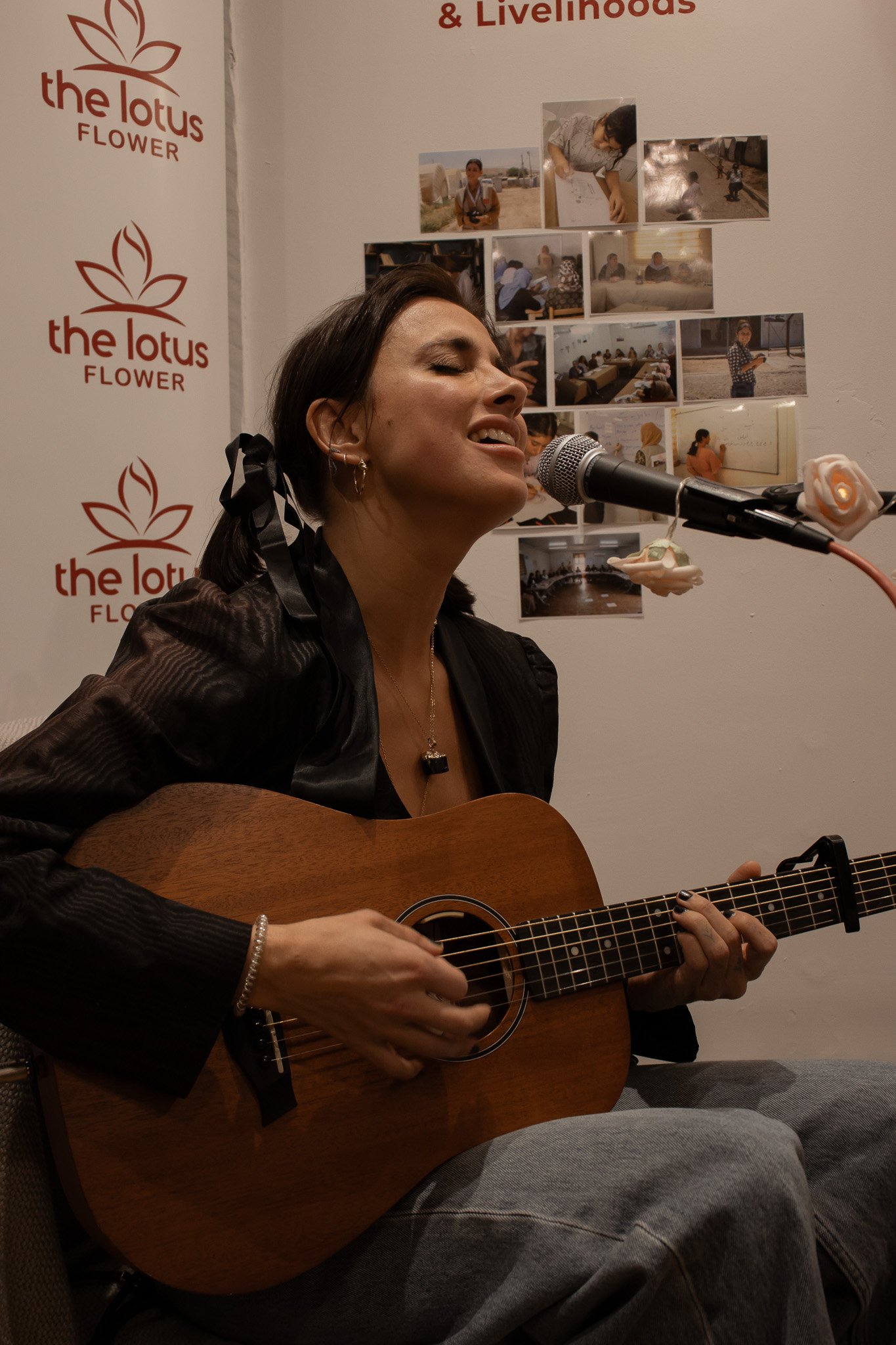
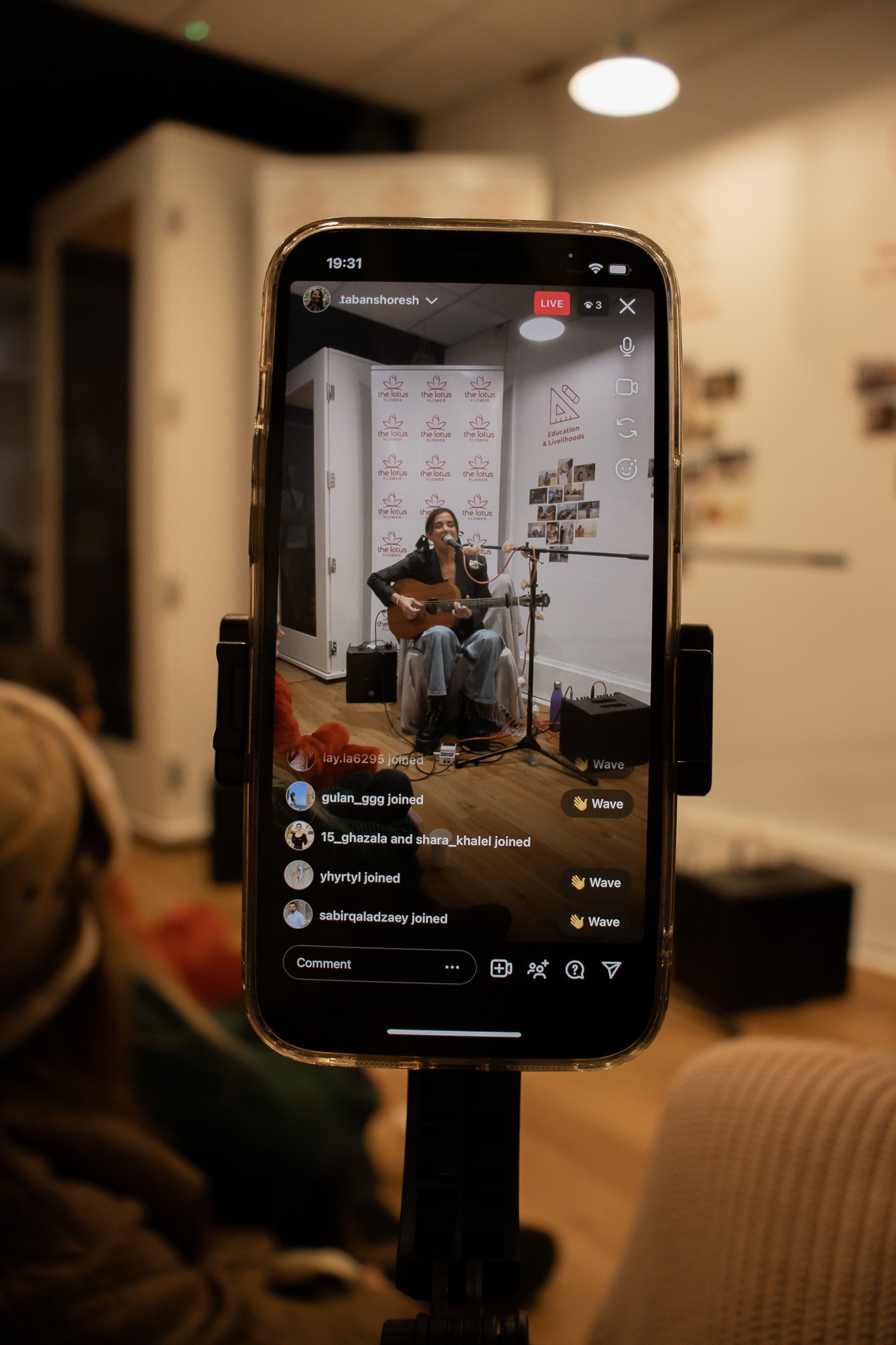
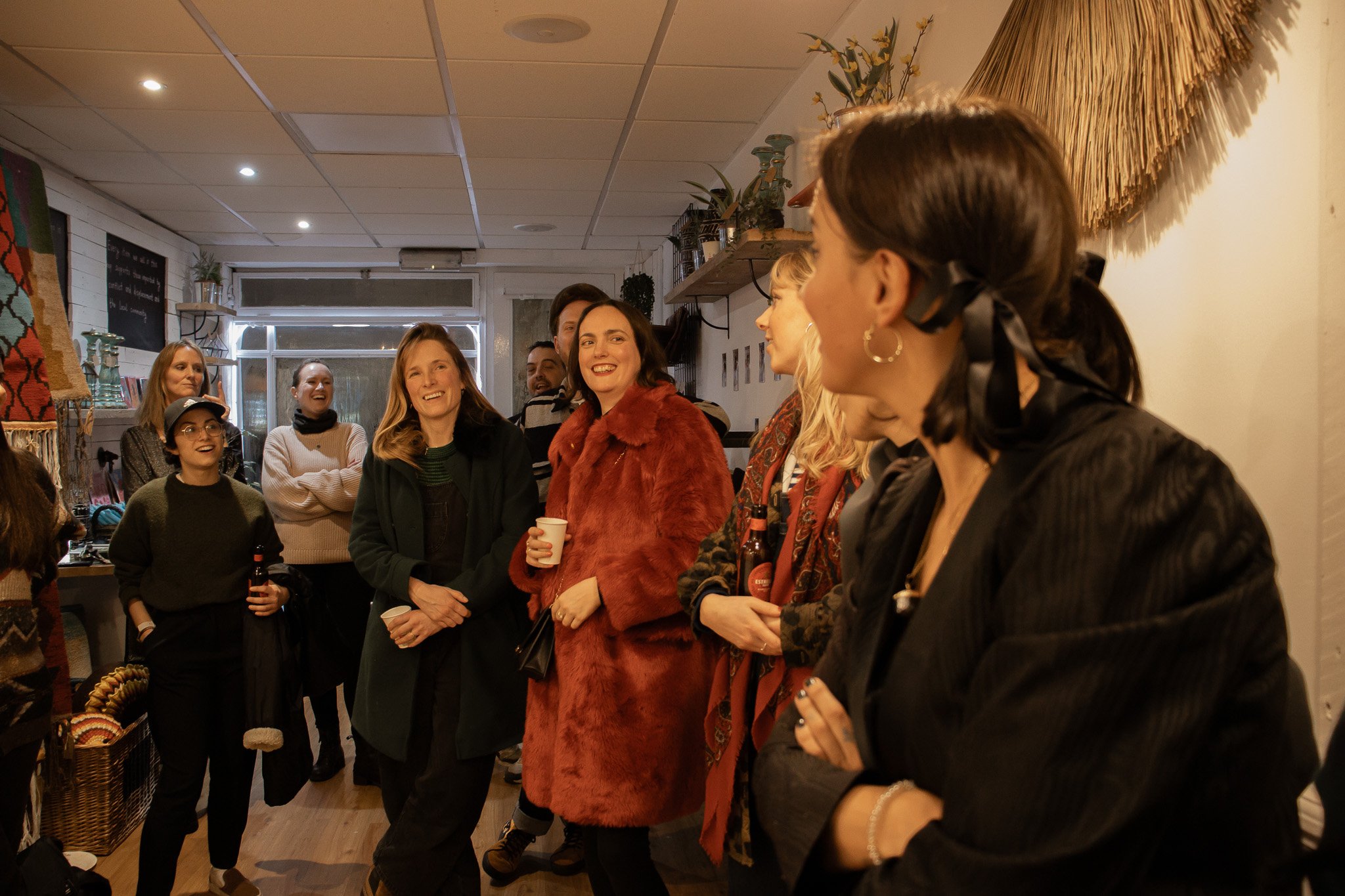
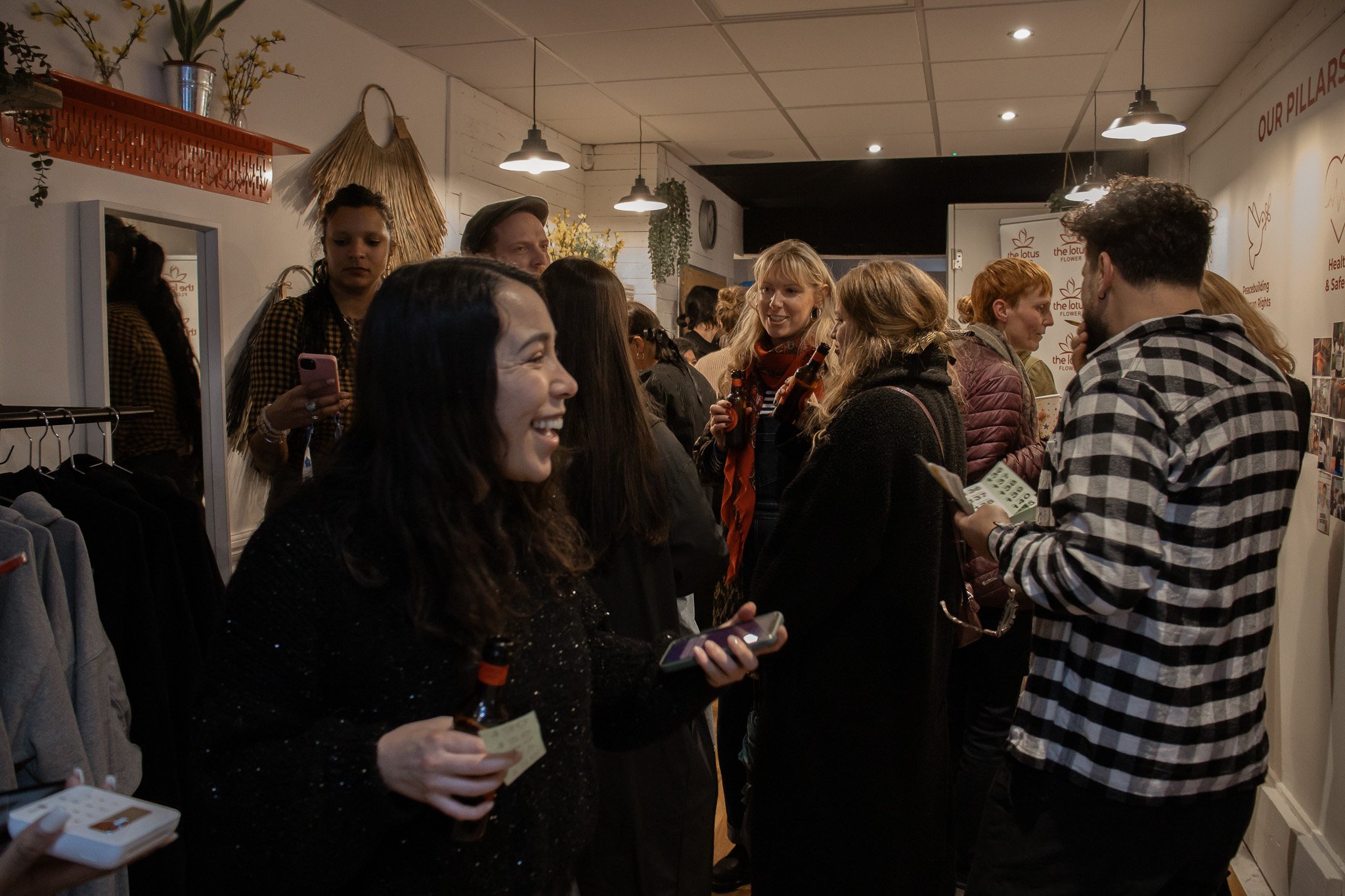
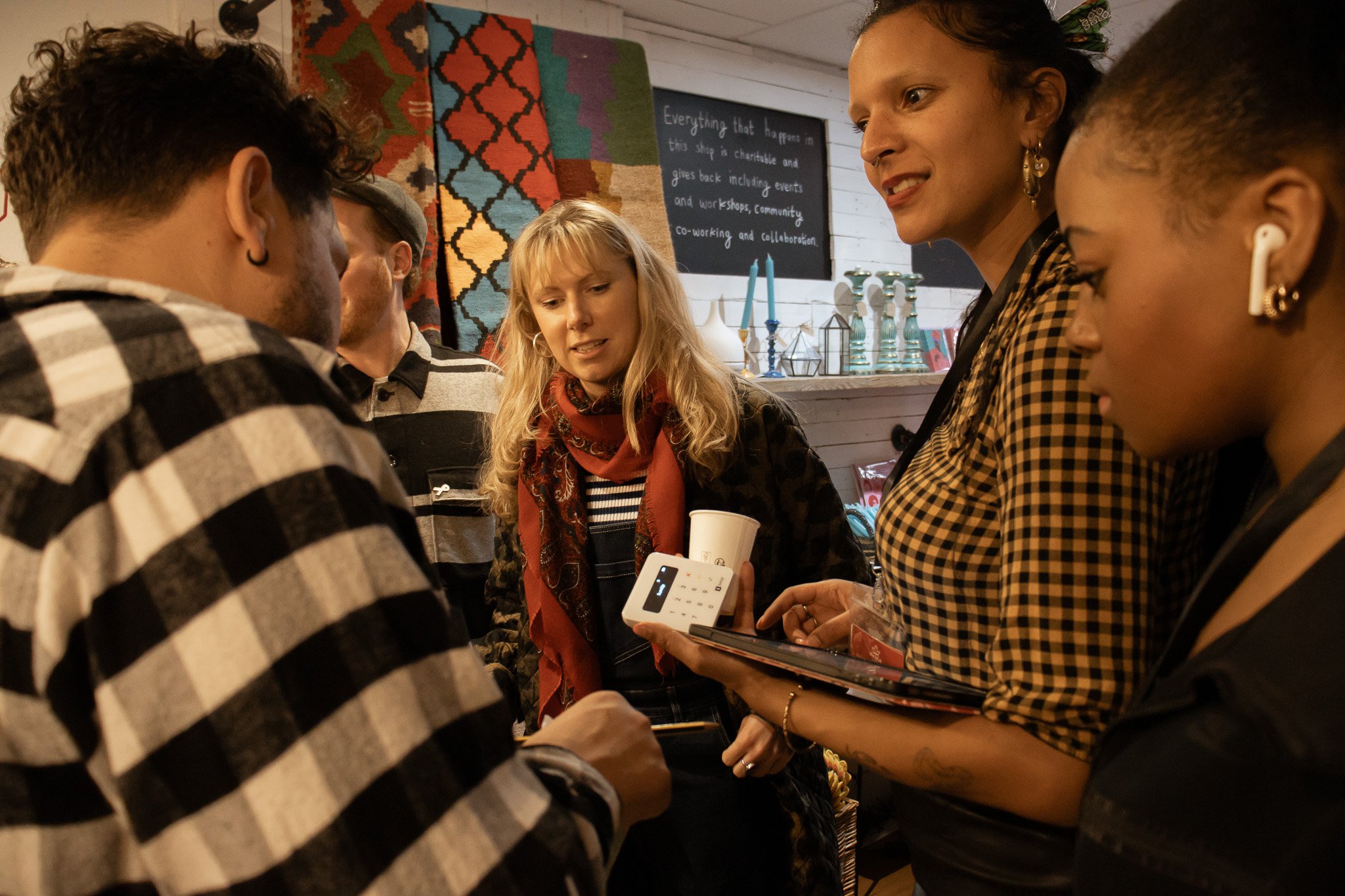
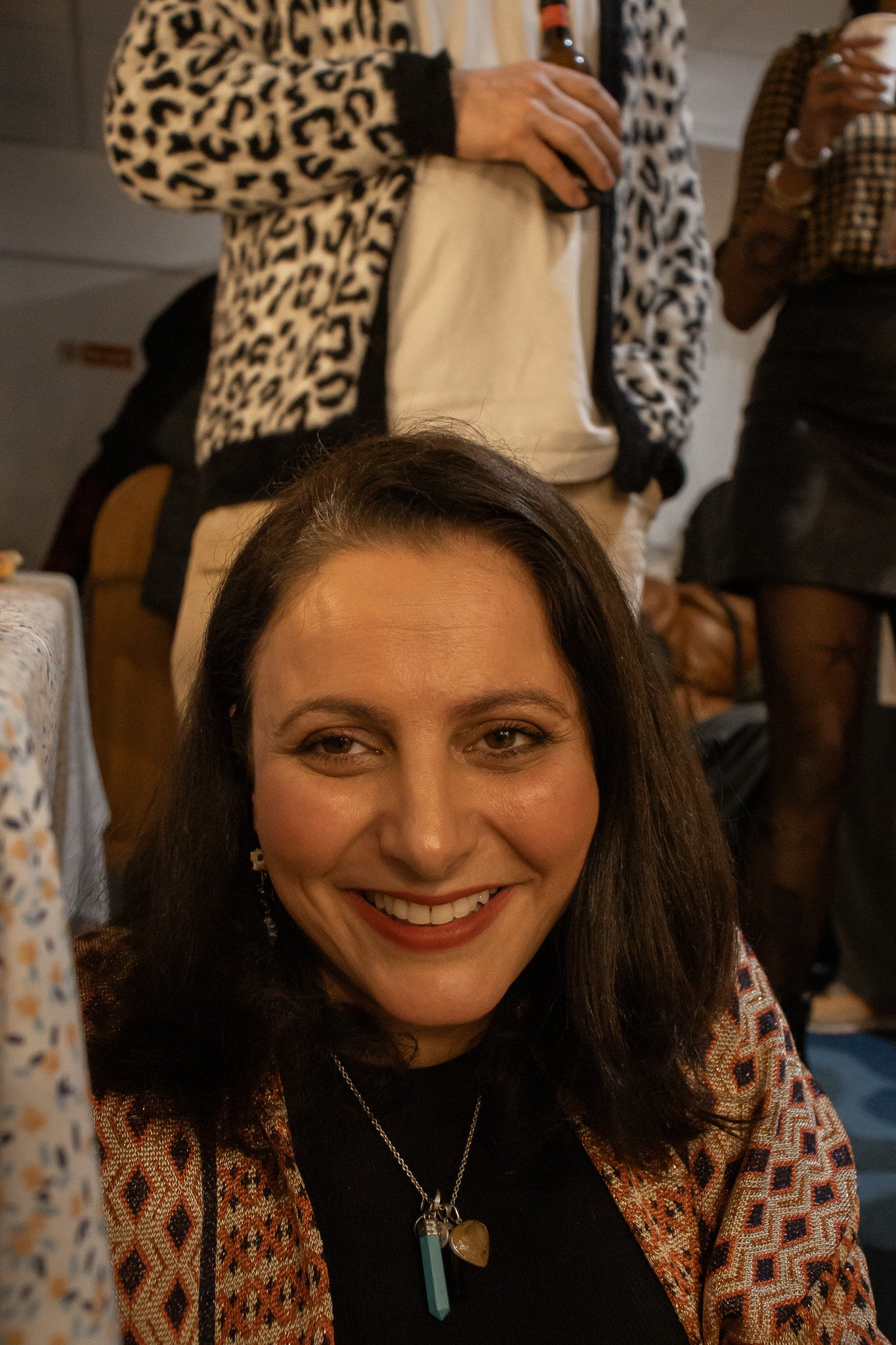
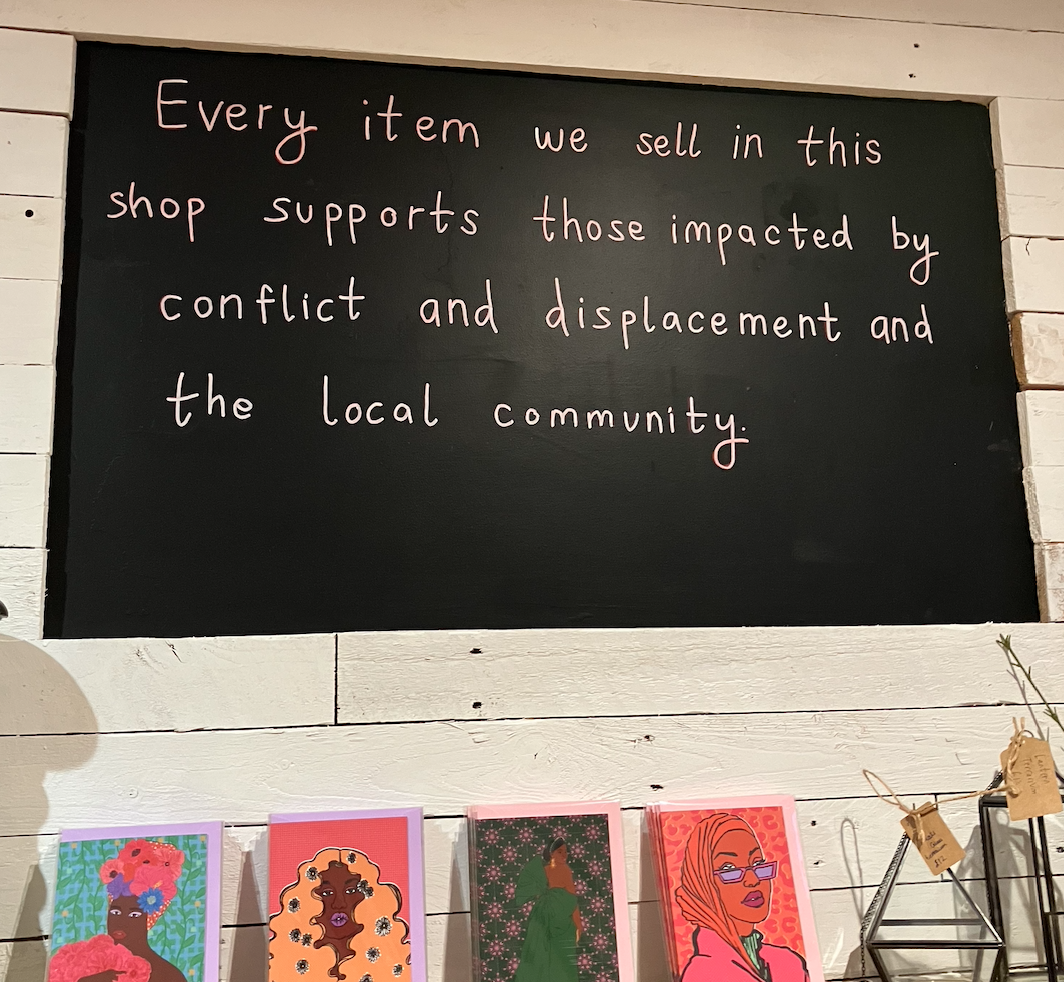
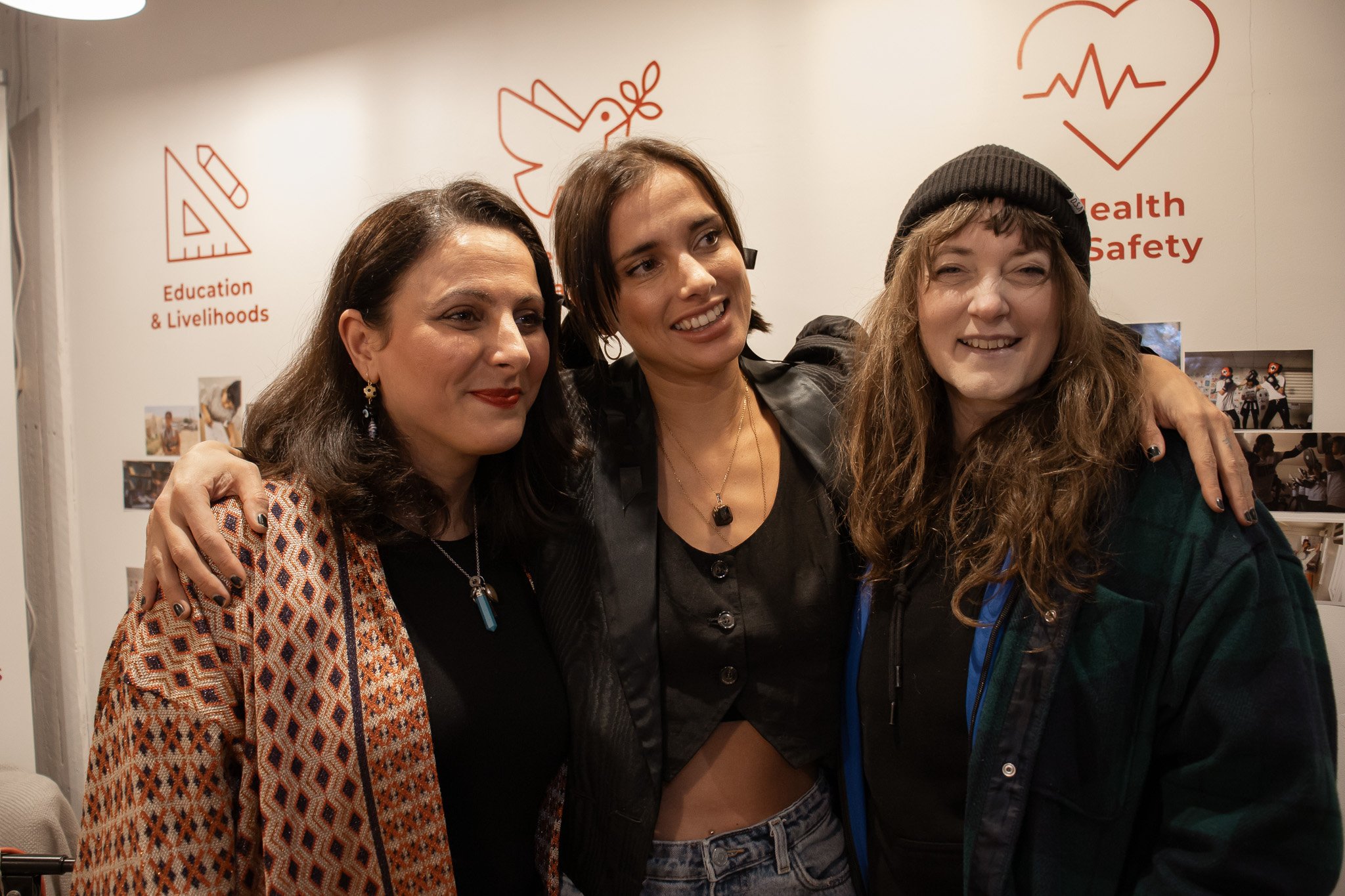
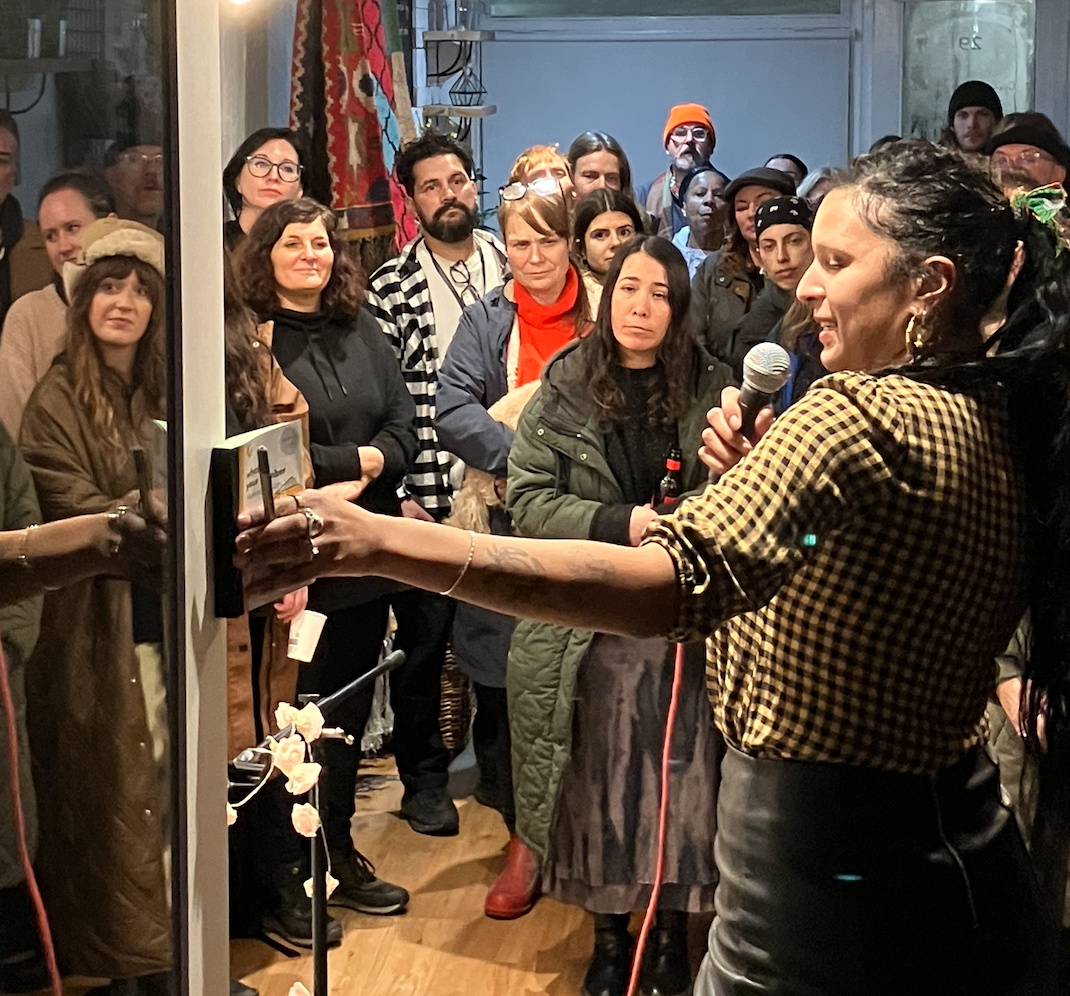
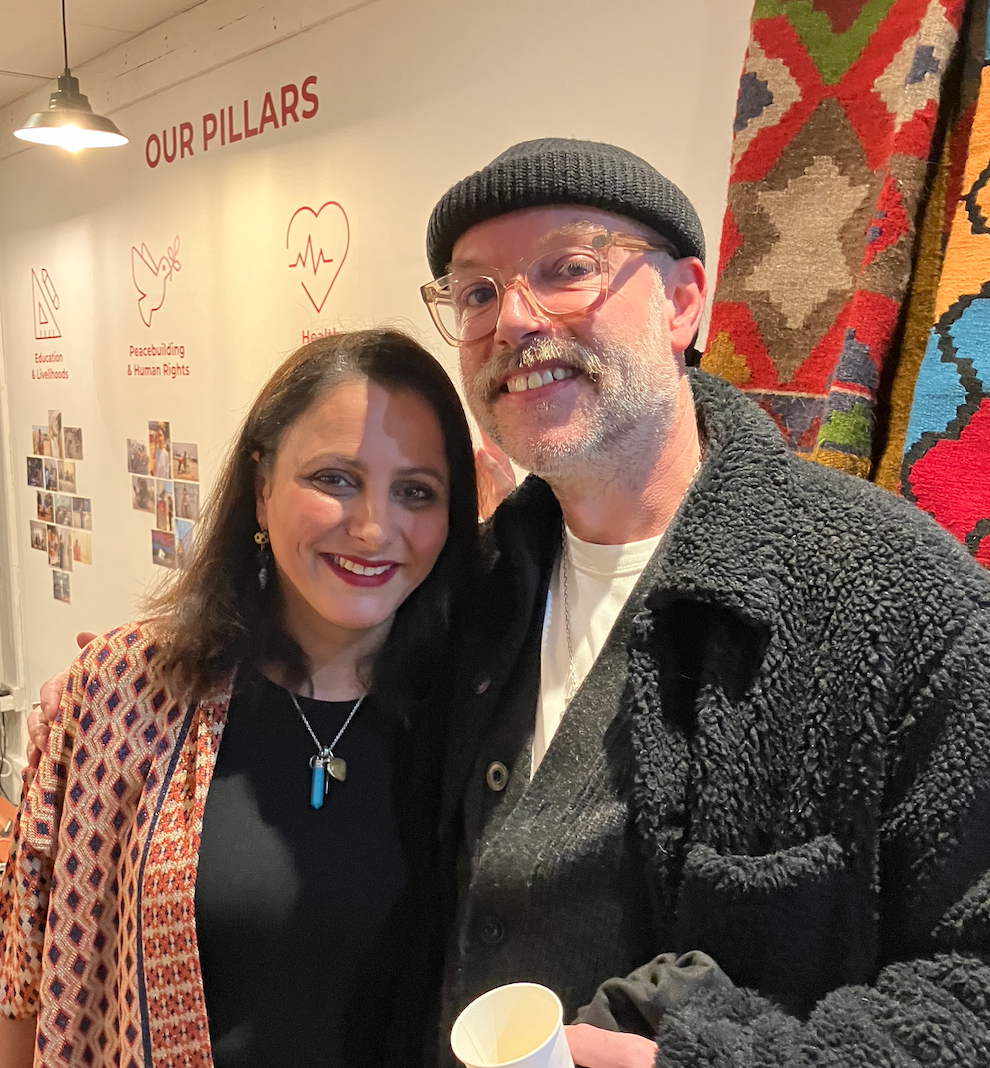
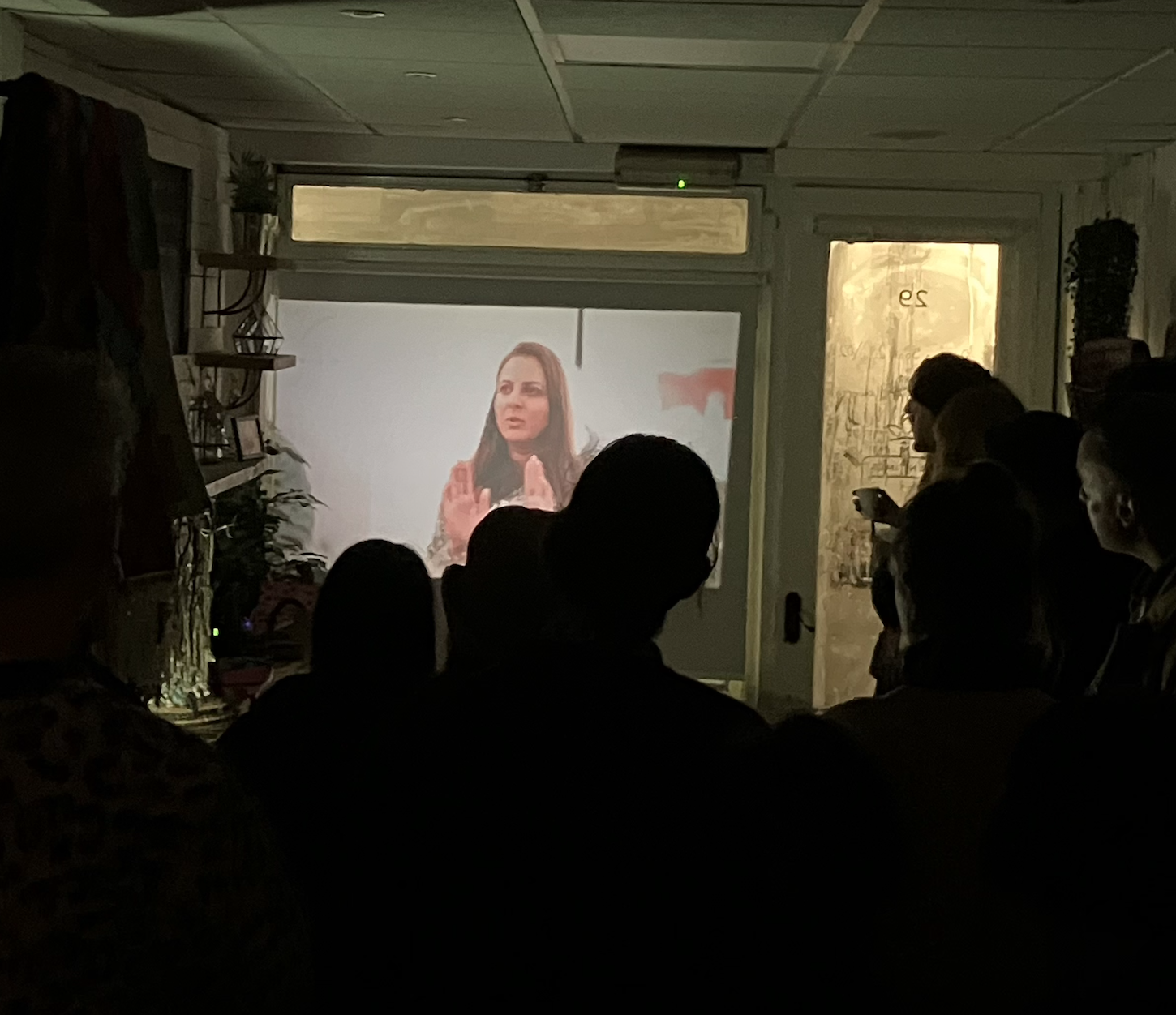
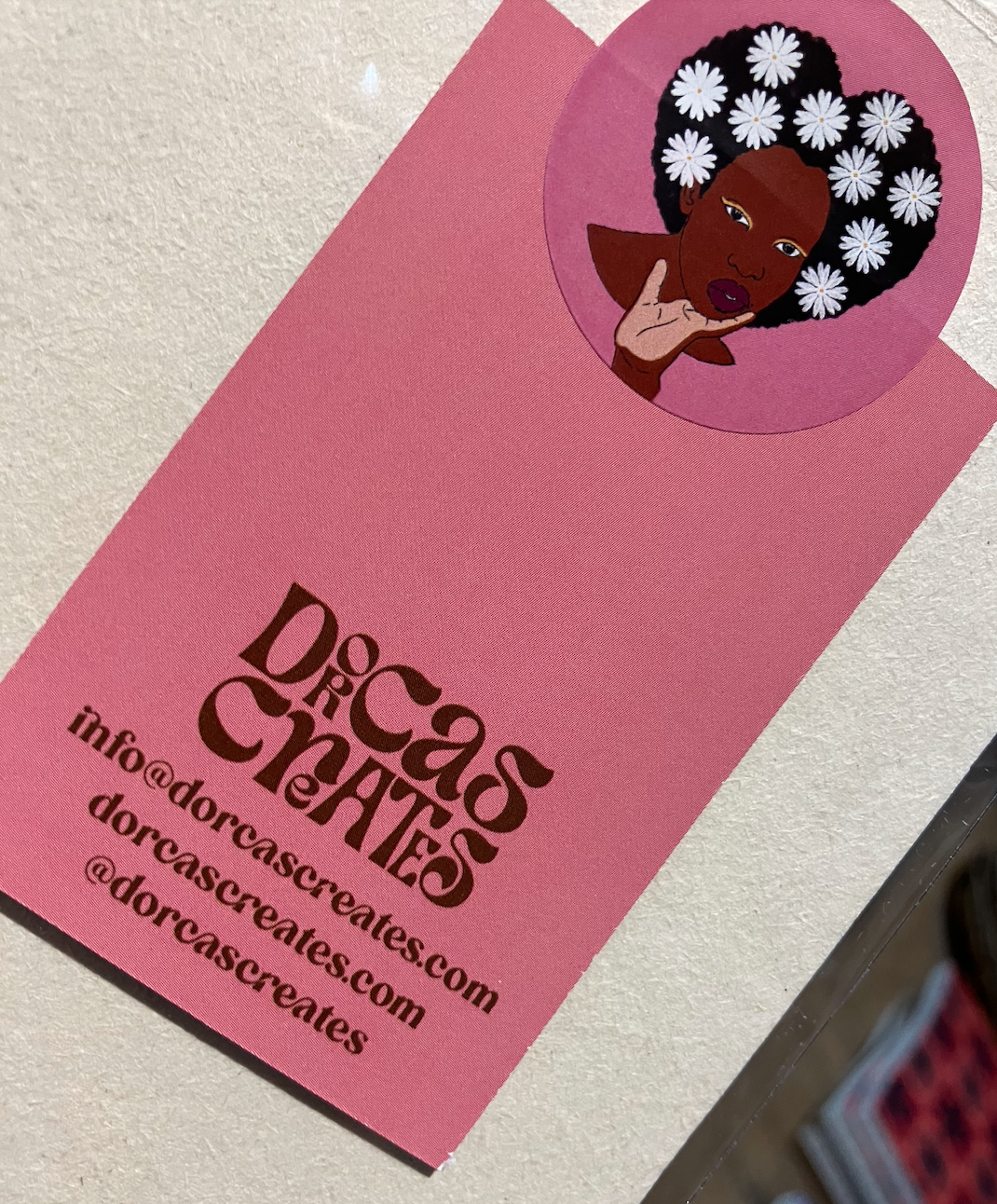
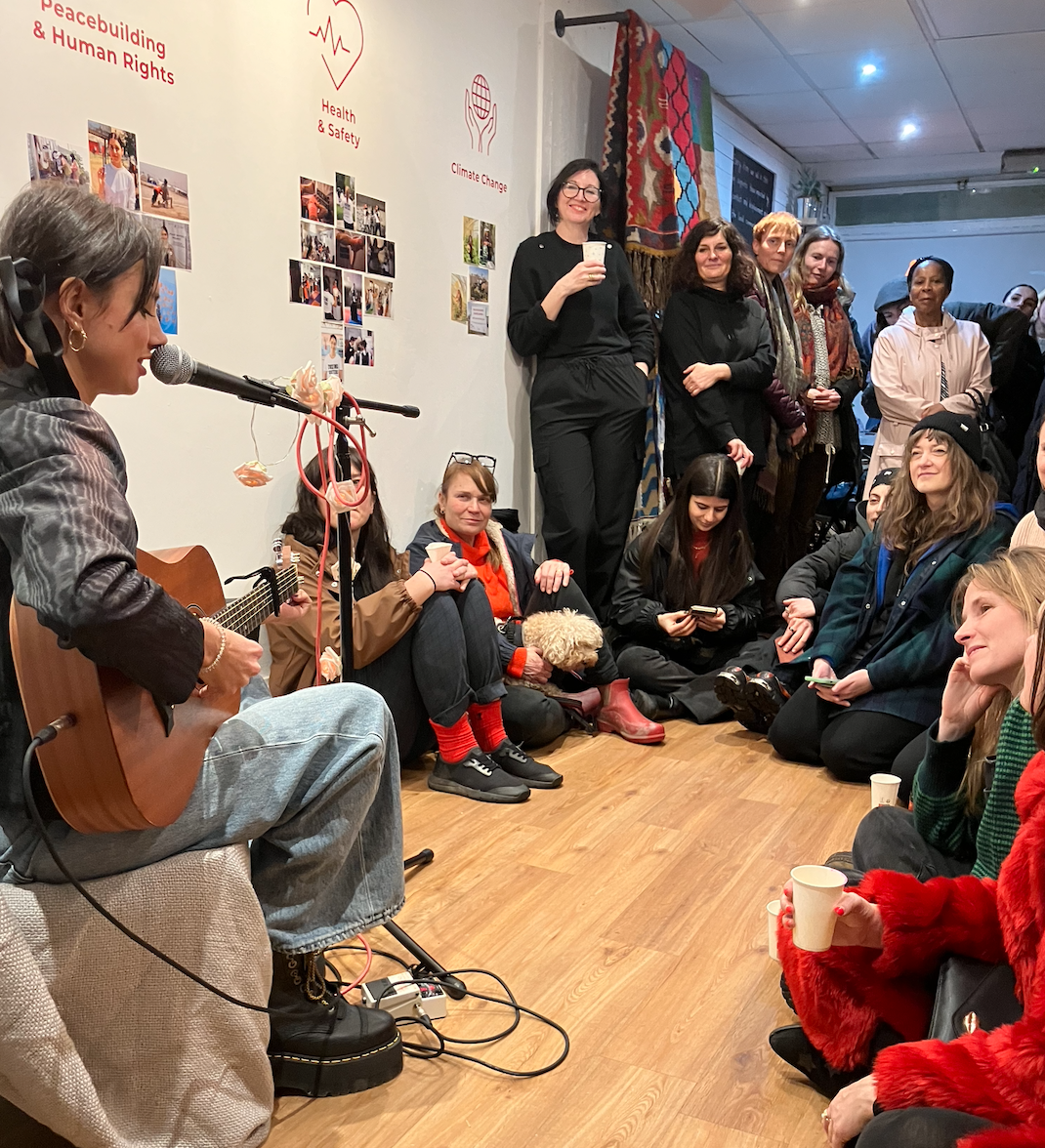
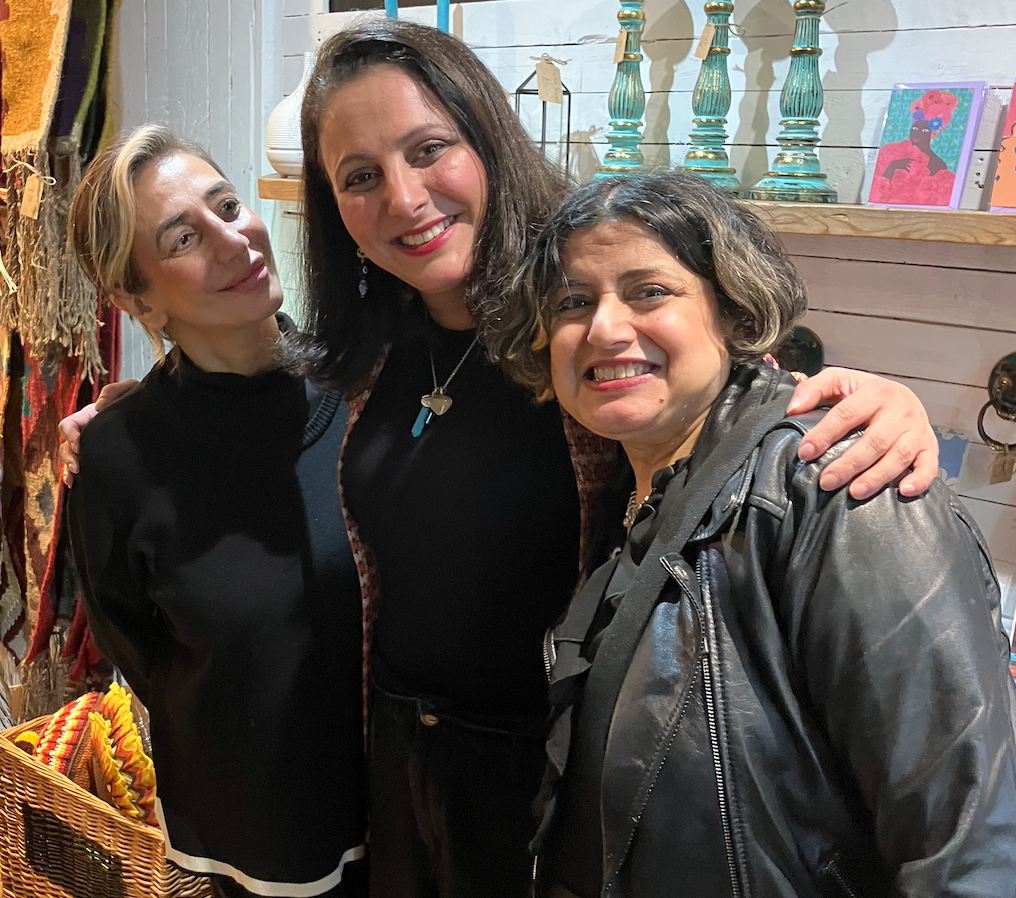
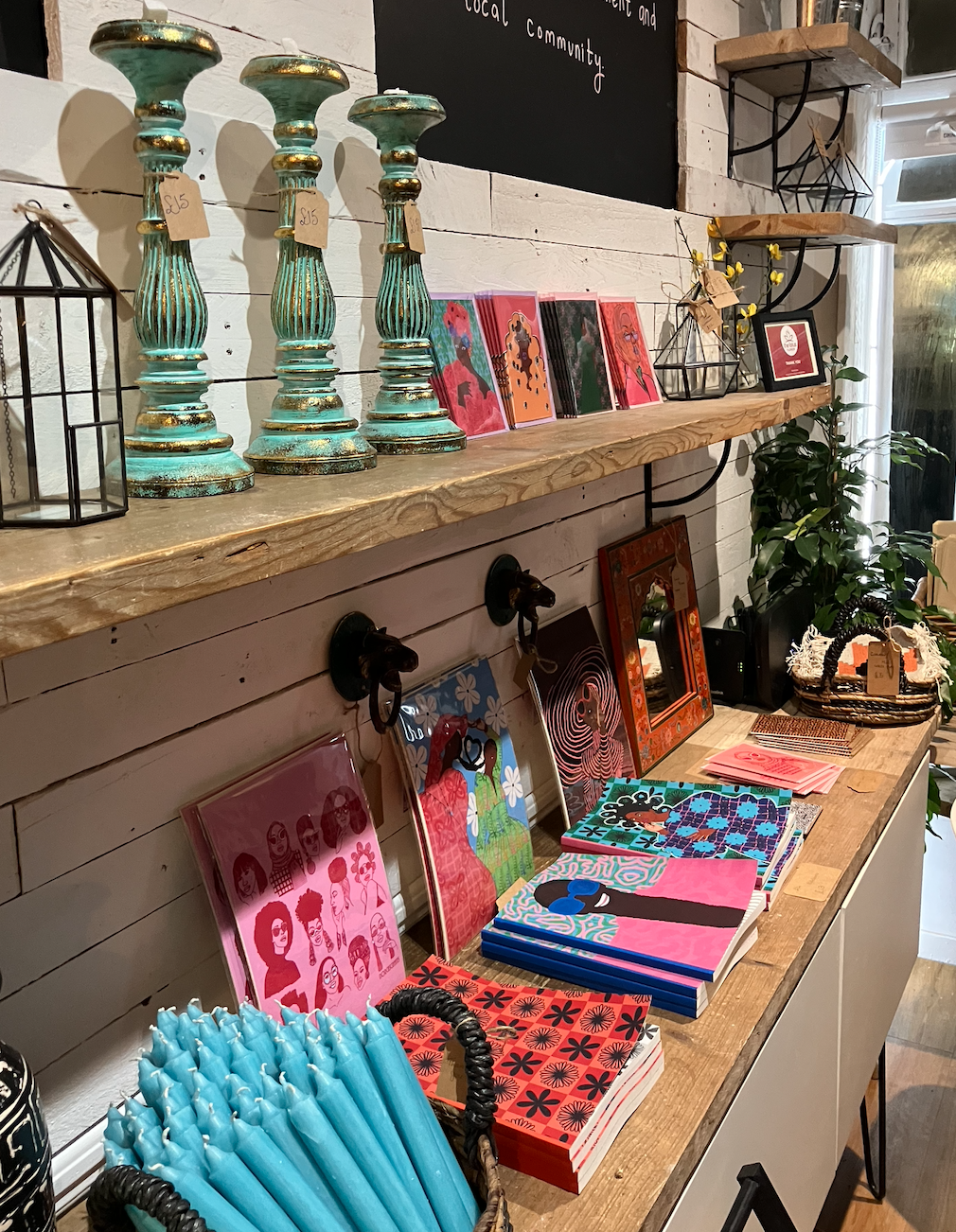
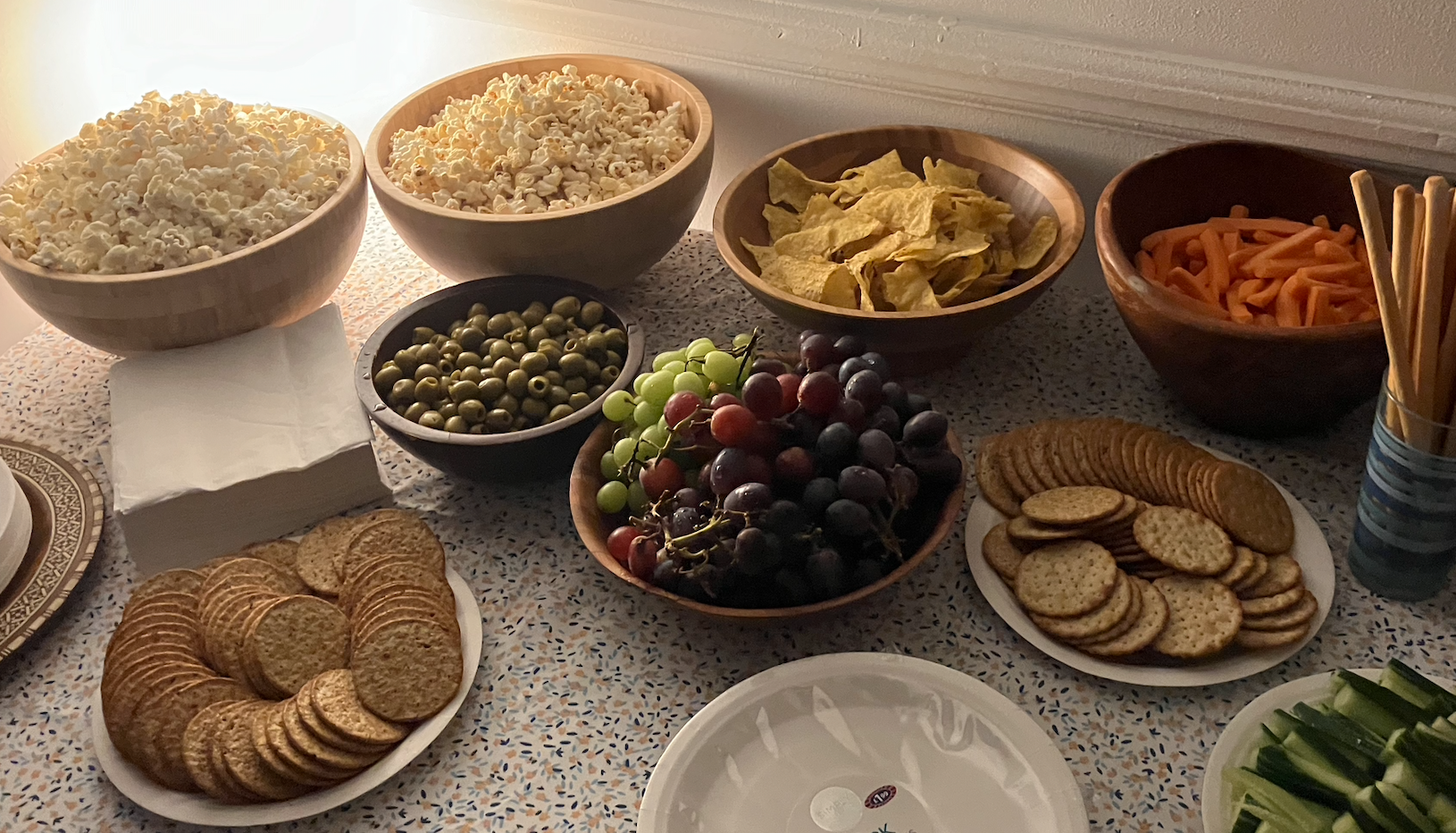
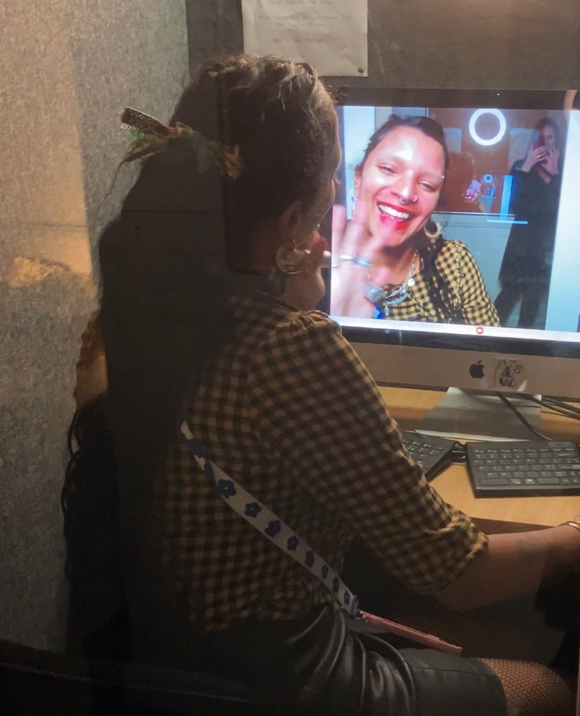
Inside The Lotus Flower’s first Women and Climate Action conference
We are extremely proud to have organised and hosted our first ever Women and Climate Action conference this week.
The event at the Rixos Hotel in Duhok brought together a range of high-profile speakers and guests for important discussions around the most pressing impacts of climate change on women and girls, and ways in which we need to work together to tackle them.
Our Regional Director Vian welcomed Benjamin Hanna, Acting Consul General of Germany in Erbil
Kindly funded by the German Consulate in Erbil, the conference included a keynote speech by Dr Nazand Begikhani, Senior International Advisor to the KRI President on Gender and Higher Education, who stressed the importance of learning from climate-friendly practices of Kurdistan’s older generation. She also referenced scientific studies which show how women and girls are most vulnerable to the rising threats of climate change.
Dr Nazand Begikhani spoke about the climate threats facing women and girls
We also had welcome contributions from Duhok Governorate office and Dr Khanzad Ahmed, Secretary General of the High Council for Women and Development, who was representing the Kurdistan Regional Government. She said: “We are working at a high level to incorporate women’s views and demands into government policies, programs and initiatives. As you all know, this is not an easy task, but there is an opportunity now, and we want it. Climate change can have profound and multifaceted impacts on women, peace, and security, exacerbating existing vulnerabilities and creating new challenges. We must fight against the violence that women face due to climate change.”
Dr Khanzad Ahmed was representing the KRI Government
Dr Khanzad also spoke of the importance of everyone playing a role in tackling the issues at institutional level – through organisations, governments and the private sector – as well as at regional, national and global levels.
Another conference highlight was a topical panel discussion, which was moderated by Yasemin Sener from UNHCR Iraq. Speakers on the panel included Kadry Furani, the Country Director of CARE Iraq, who drew upon the strong connections between climate change and violence against women and girls, and how those living in displacement are especially impacted. Additionally, he explained how organisations and civil society can begin to reduce harmful environmental impacts through improved daily practices in the workplace.
Our panel in action
Fellow panellist Benjamin Hanna, Acting Consul General of Germany in Erbil, provided useful insights into Germany’s Feminist Foreign Policy, which calls for equal participation in the community and also focuses on women and climate change. Other speakers on the panel were Sirwa Rasool, Director General of the Joint Crisis Coordination Center, and Kareen Zuher, CEO of Karini Tav renewable energy company.
Meanwhile, our Regional Director Vian emphasised the importance of mainstreaming gender in climate-related interventions, and called for women and girls to have greater participation in climate action. She also told the audience that this is a key priority for the Lotus Flower, and that we hope to implement more projects which reflect this in the near future.
Our Regional Director Vian addressed the audience
A video was also shown about the Lotus Flower’s work to date, touching upon our Founder Taban’s journey and what inspired her to start the organisation back in 2016. There were also public displays showcasing some of our work, including our recent Earth Sisters climate project, and a musical performance by our partners at Nudem NGO.
With Iraq now recognised as the world’s fifth most vulnerable country to climate change and women and girls bearing the brunt of its effects, we were so glad to have the chance to further such conversations and explore solutions through our conference, and we look forward to many similar opportunities in future…
How refugee Muhammed is rebuilding his life with his thriving in-camp shop
Muhammed is an inspiring survivor we support, who experienced the full atrocity of war and conflict in Syria.
“Our house was bombarded,” he says. “My sister's back was severely wounded, my nephew’s arm was cut in half and my niece's foot is still disabled.”
Muhammed, from Hassakah, has always needed special care and a wheelchair as he cannot walk. He has now been a refugee for almost 10 years and lives at Domiz 2 camp.
Previously, Muhammed had a small shop providing TV box and satellite receiver tools, but he had few items to sell and struggled financially because his mother was very ill. Until she sadly passed away, the family spent most of their money on her medicine and treatment.
His shop grew ever more empty, and some days he would not even open to the public. Though he tried repeatedly to grow his business in order to support his family, he lacked the financial means to invest in it.
Then Muhammed heard about our She Leads in Food Security project and applied to take part. He was selected according to the vulnerability criteria as well as a technical assessment, and he then participated in our Get Ahead Business Training sessions.
As one of the beneficiaries who also received a financial grant, his venture could really begin, and he relaunched his shop. “When The Lotus Flower came along with this project, everything started to get better,” he says.
Being able to afford the things he needed for the business led to more customers coming to the shop, meaning they could meet their needs more sustainably, without having to leave the camp.
The support also allowed Muhammed to buy relevant equipment – such as a security camera and a laptop for installing satellite and TV programs to make his work more efficient. He also plans to use space in his shop for professional printing and scanning services.
He promotes his business through social media, attracting clients from outside the camp, and says that the project has been highly beneficial in enabling his personal and professional growth, with his father now even assisting him in the shop.
“The grant helped me psychosocially too, as I have stronger self-confidence and better networking and marketing skills. The experience I got from the business training also helped me communicate with customers and manage my shop better.”
We’re just delighted that our project – delivered in partnership with Care Iraq through Deutsche Gesellschaft für Internationale Zusammenarbeit (GIZ) GmbH – made such a difference to Muhammed’s life…
Meet our Psychologist and GBV Coordinator Alind
Alind is our Psychologist and Gender-Based Violence Coordinator, who first started working with the Lotus Flower three years ago, while studying for an MA in Psychotherapy and Psycho-traumatology.
He now works at our Essyan, Domiz 2 and Rwanga camp centres, and plays a big part in our violence protection project with UNTF. As Alind says: “We provide psychological therapy sessions for groups and individuals, Positive Masculinity workshops, GBV awareness, case management, livelihoods support and business management training.”
Using carefully tailored techniques such as Cognitive Behavioural Therapy and Narrative Exposure Therapy for PTSD, Alind adds: “Some people think we just come from home and listen to peoples’ problems and give them some advice.
“But the fact is, we professionally diagnose their condition and prepare a plan according to the individual, and use specific techniques to improve their mental health. It takes a lot of time and effort. Sometimes we spend four hours in one therapy session.”
Although it is often challenging work, it can bring huge benefits to people’s lives, and recalling a case where he has personally made a difference, Alind says: “Due to poor financial conditions, one woman gave up her two children because she couldn’t care for them. But with a financial grant from the Lotus Flower and psychotherapy sessions, she now runs her own successful business and has taken her children back. She also feels well mentally.”
Offering vital mental health and wellbeing support is important to everyone at the Lotus Flower, and for Alind, it provides plenty of job satisfaction and personal reward. “I hear a lot of stories of women and girls who have been displaced for more than 10 years, and so many feel hopeless. But when I can be a bridge moving them from a bad place to a good one, it makes me happy.”
In the future, Alind wants to continue his studies and pursue a PhD in psychotherapy – and we are certain he will be highly successful in his next endeavours…
How we're protecting vulnerable children and young people
As a part of our ongoing general protection project with Care Iraq through funding from ECHO, our team continue to conduct a range of activities with children which help keep them safe from harm.
This includes child protection case management, which targets those most in need of support, advice and referrals to specialised health, psychosocial and legal services.
In addition, awareness sessions are regularly held with women and adolescent girls in safe spaces on topics such as early and child marriage, domestic violence, reproductive rights, sexual abuse and exploitation, the significance of girls' education, cyber abuse and the causes and effects of GBV. These sessions reach participants within their own homes, at our centres and in school settings.
As another key element of the project, we also enhance young people’s skills through child resilience sessions, where participants are taught how to communicate with each other in more productive and healthier ways, as well as how to cope better with the many hardships they may face on a daily basis.
We also engage children through art therapy sessions, where they are encouraged to express themselves in more creative ways. The classes help improve their wellbeing, enabling them to share their feelings in non-verbal ways.
We believe the work we are doing with this younger generation is crucial in order to safeguard and protect them from future issues and harms. We also maintain that by providing them with an understanding of vital protection concepts, the project will in turn help inform their roles in creating healthier, more resilient and fairer communities.
Elsewhere, the project is targeting hundreds of vulnerable women and men in urban locations around Seje, Sharya, Khanke and Derabon, providing mental health support as well as emergency cash assistance for those who are unable to meet the cost of essentials – such as rent, medical equipment or transportation fees.
We’re so pleased we have the chance to make a difference to so many lives in this way…














